Terracotta kitchen floors offer an immediate sense of warmth, history, and rustic charm that few other materials can replicate. Derived from the Italian for "baked earth," these clay tiles bring a natural, organic element into the heart of the home. Their rich, earthy tones, ranging from soft blush and orange to deep reds and browns, create a welcoming and timeless foundation for various kitchen designs. Whether you're aiming for a Mediterranean villa aesthetic, a cozy farmhouse vibe, or a modern rustic space, terracotta tiles provide a versatile and durable flooring choice that ages beautifully over time.
1. Classic Square Terracotta Kitchen Floor Tiles
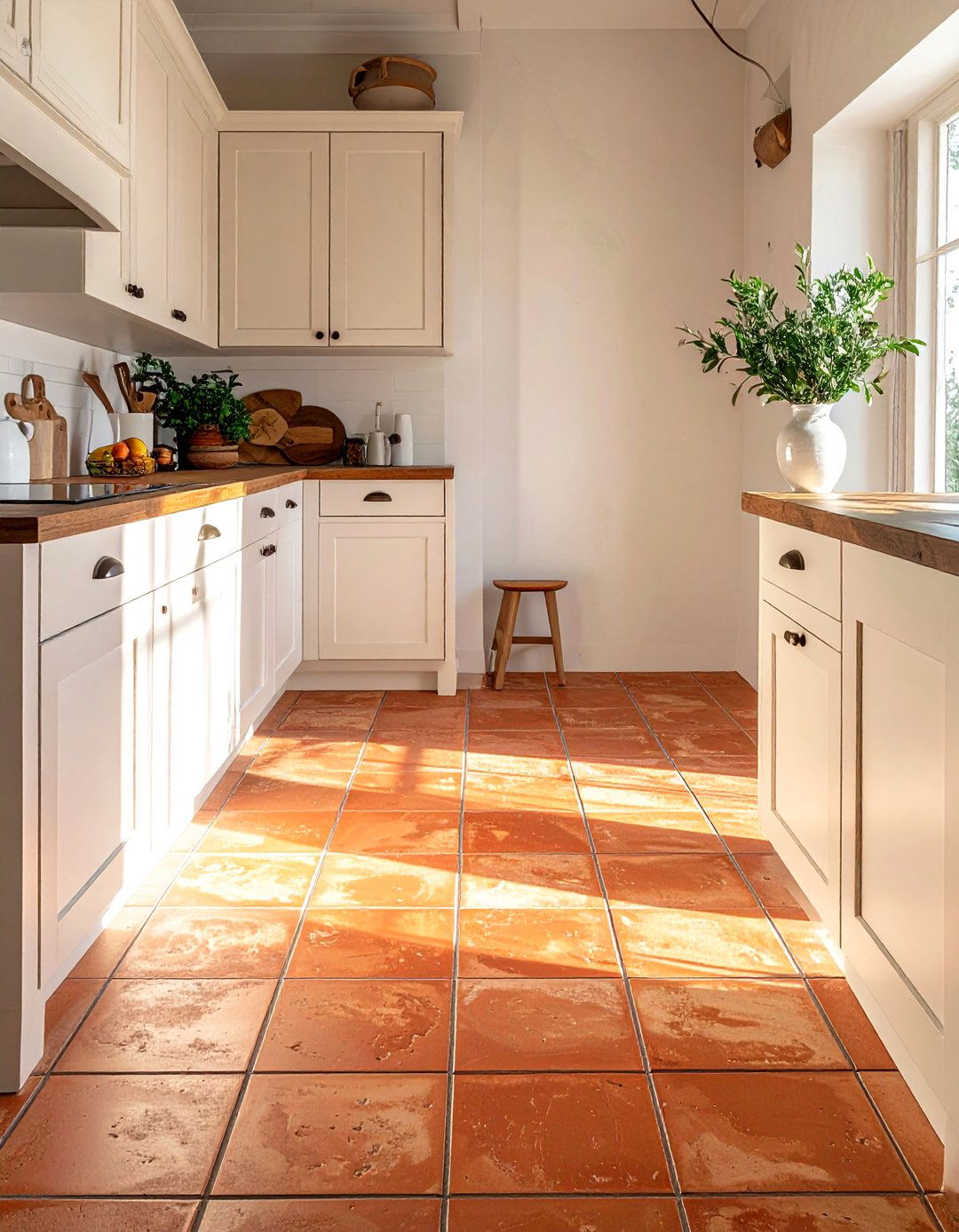
For a timeless and authentic rustic look, classic square terracotta kitchen floor tiles are an unbeatable choice. This traditional format creates a clean, grid-like pattern that feels both orderly and earthy. The natural color variations in each tile, from pale peach to deep burnt orange, prevent the floor from looking monotonous and add immense character. Paired with simple white or cream-colored cabinets and wooden countertops, square tiles establish a warm, inviting atmosphere reminiscent of a country farmhouse or a Mediterranean home. This style is versatile, providing a perfect canvas that complements both traditional and more contemporary rustic kitchen decor elements, ensuring a look that will never go out of style.
2. Hexagonal Terracotta Kitchen Floor Tiles
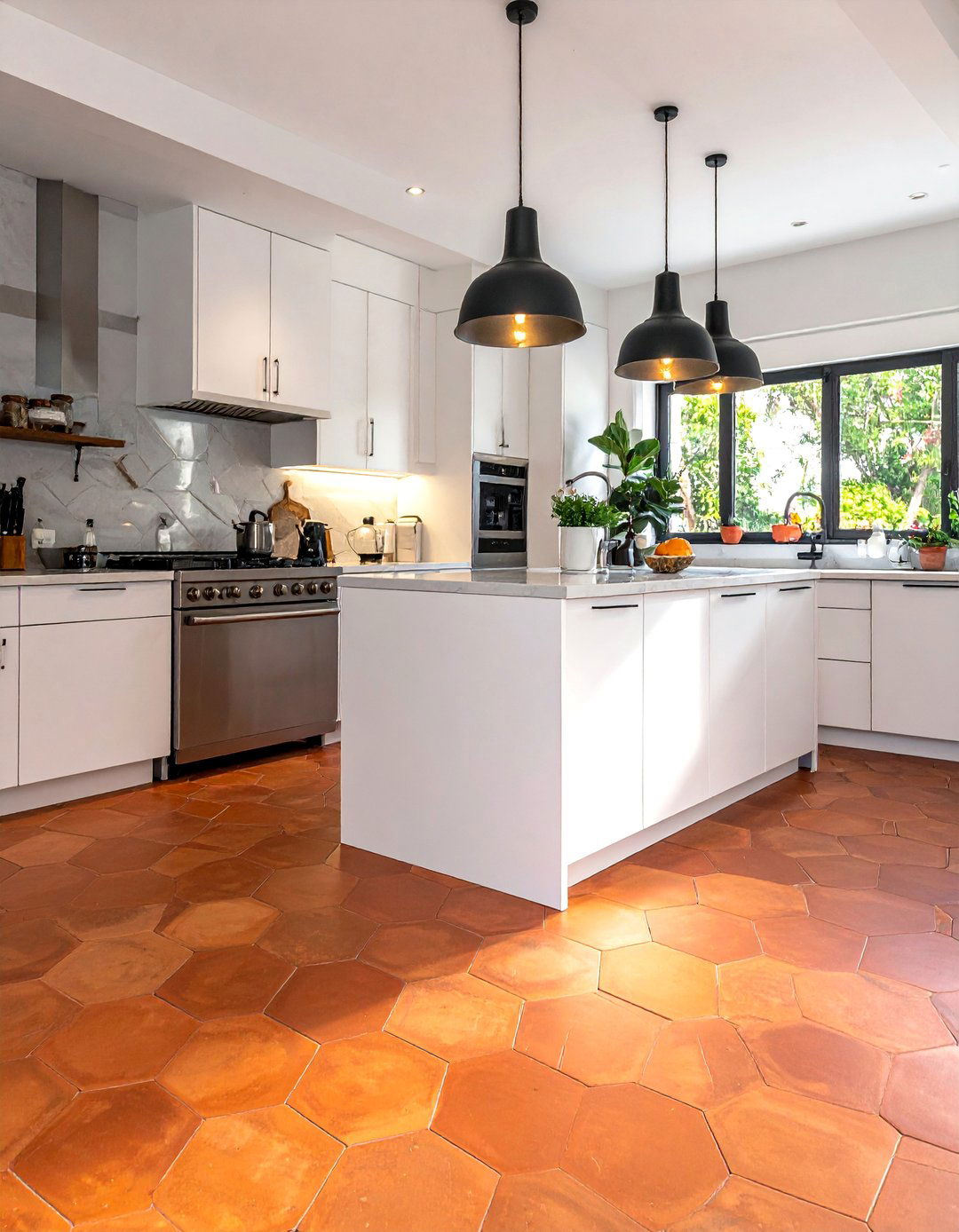
To introduce a modern twist on a rustic classic, consider hexagonal terracotta kitchen floor tiles. The six-sided shape creates a captivating honeycomb pattern that adds geometric interest and a touch of contemporary flair to the kitchen. This design choice moves beyond the traditional grid, offering a dynamic and visually engaging foundation for your space. Hexagonal tiles work exceptionally well in kitchens aiming for a modern farmhouse or bohemian aesthetic. The earthy, warm tones of the terracotta prevent the geometric pattern from feeling cold, perfectly balancing modern design with rustic comfort. When paired with sleek cabinetry and metallic fixtures, the result is a sophisticated yet grounded kitchen atmosphere.
3. Herringbone Pattern Terracotta Kitchen Floor
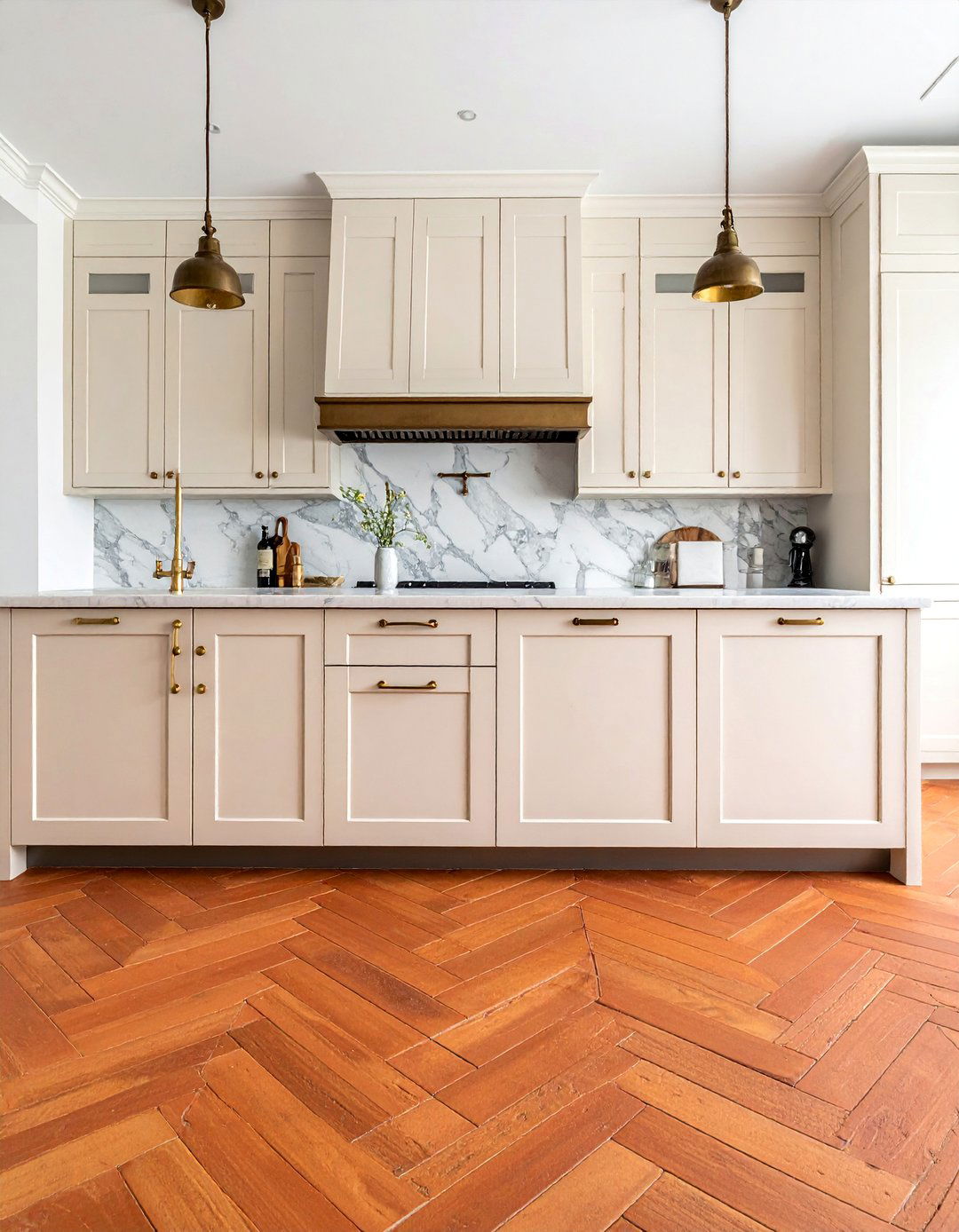
A herringbone pattern terracotta kitchen floor instantly elevates the space with a sense of sophistication and movement. This classic arrangement, where rectangular tiles are laid in a zigzag pattern, adds visual texture and an illusion of spaciousness. The dynamic lines draw the eye across the room, making it feel larger and more elegant. This design is perfect for those who want to blend rustic charm with a more refined, traditional aesthetic. The warm, earthy hues of the terracotta tiles soften the formal pattern, creating a look that is both distinguished and inviting. It pairs beautifully with classic shaker-style cabinets and stone countertops for a truly timeless appeal.
4. Terracotta Kitchen Floor with White Cabinets
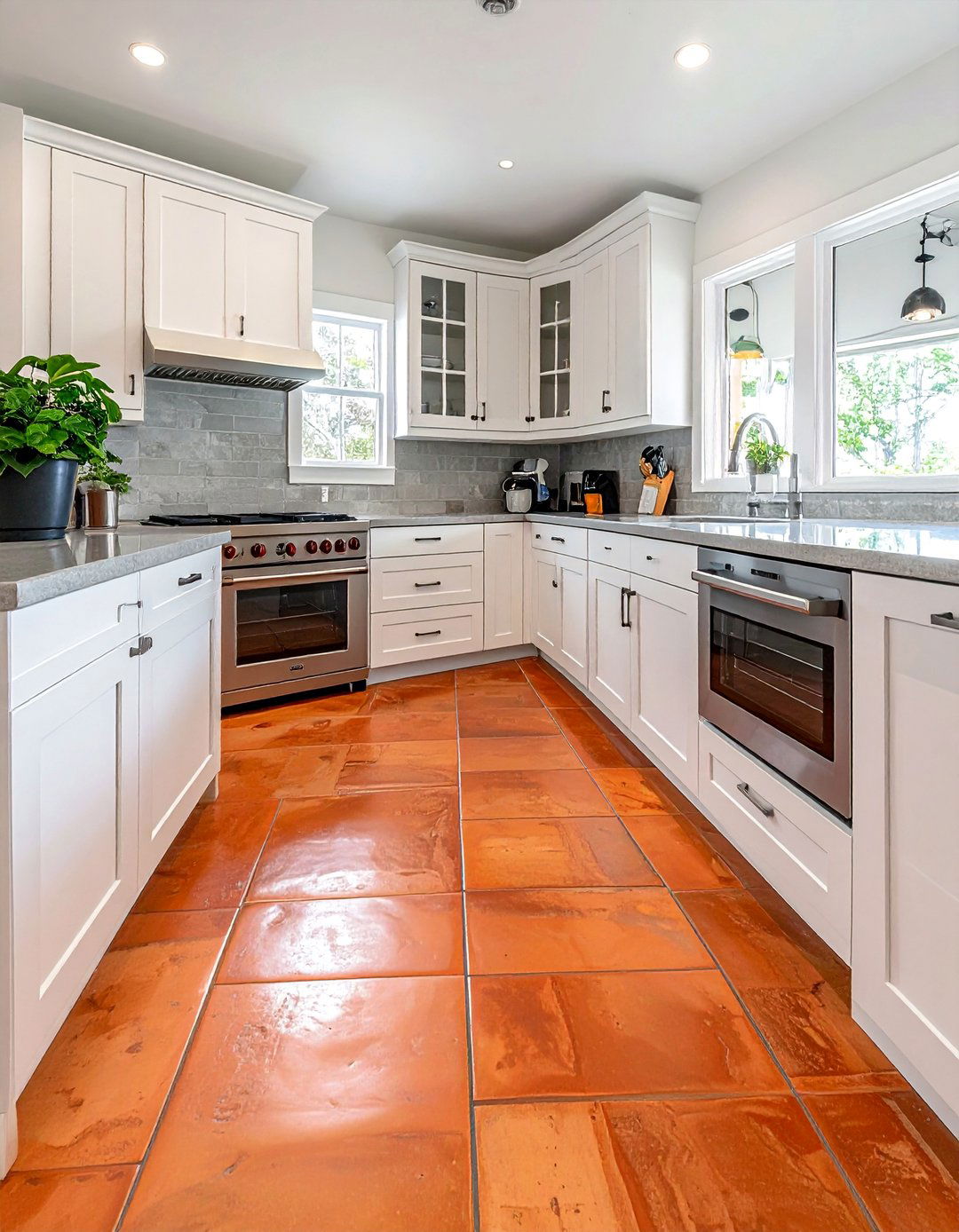
Pairing a terracotta kitchen floor with crisp white cabinets is a classic combination that creates a bright, airy, and balanced space. The deep, earthy warmth of the floor provides a beautiful contrast to the clean, reflective quality of the white cabinetry, preventing the room from feeling stark or cold. This duo is foundational to the modern farmhouse and coastal Mediterranean styles, where the goal is to create an inviting and light-filled environment. The terracotta grounds the space with its rustic texture, while the white cabinets lift it, enhancing natural light. This high-contrast look is timeless and allows for flexibility with other design elements like backsplashes, countertops, and hardware.
5. Terracotta Kitchen Floor with Green Cabinets
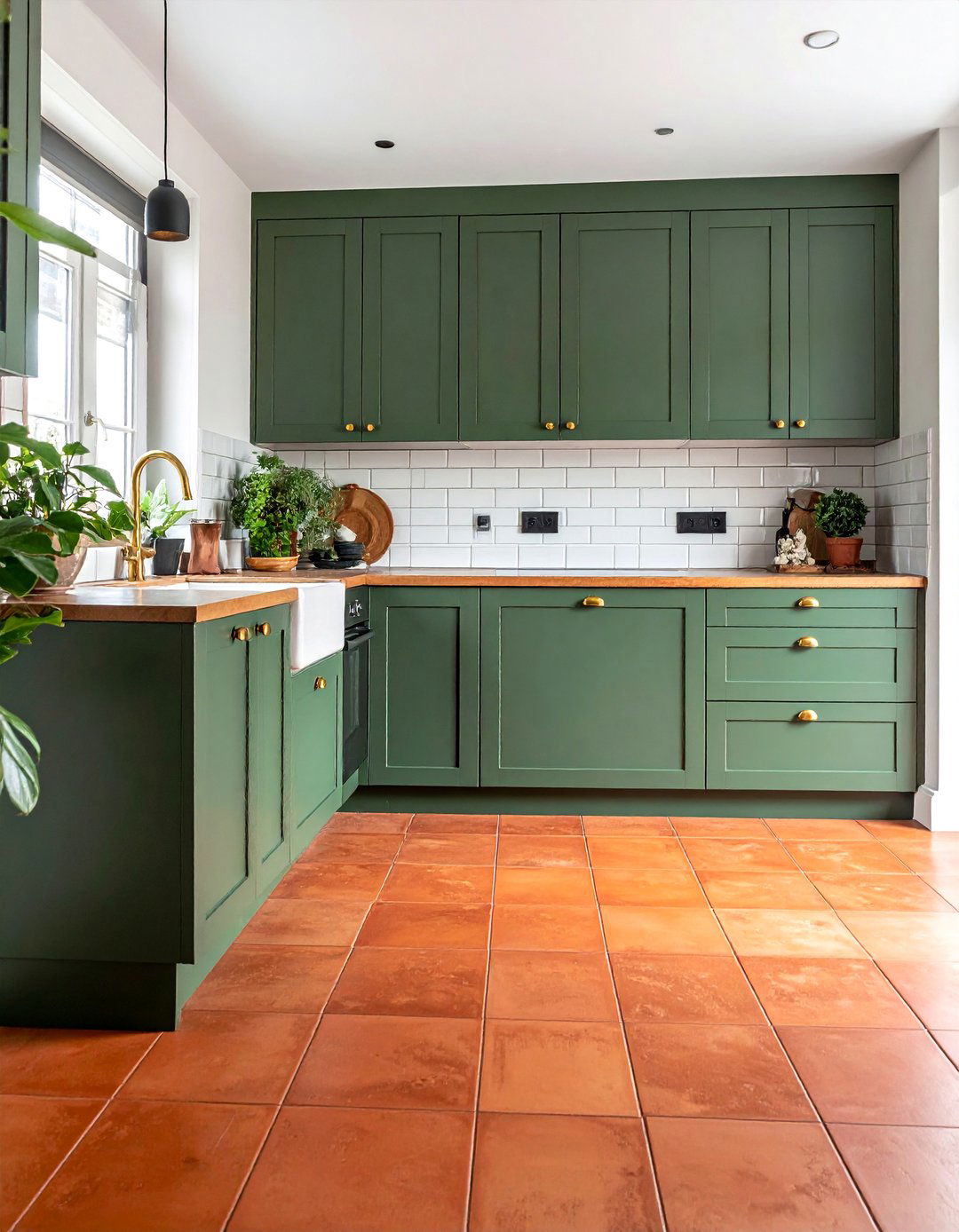
For a design that feels deeply connected to nature, combine a terracotta kitchen floor with green cabinets. The earthy red-orange tones of the tiles and the natural hue of green cabinetry create a harmonious and organic palette. Shades like sage, olive, or forest green evoke a sense of calm and tranquility, beautifully complementing the rustic warmth of the floor. This combination is ideal for creating a cozy, pastoral kitchen that feels both grounded and refreshing. The terracotta provides a warm base, while the green cabinets add a touch of sophisticated color. Finish the look with brass hardware and butcher block countertops to complete the nature-inspired, rustic aesthetic.
6. Terracotta Kitchen Floor with Natural Wood Cabinets
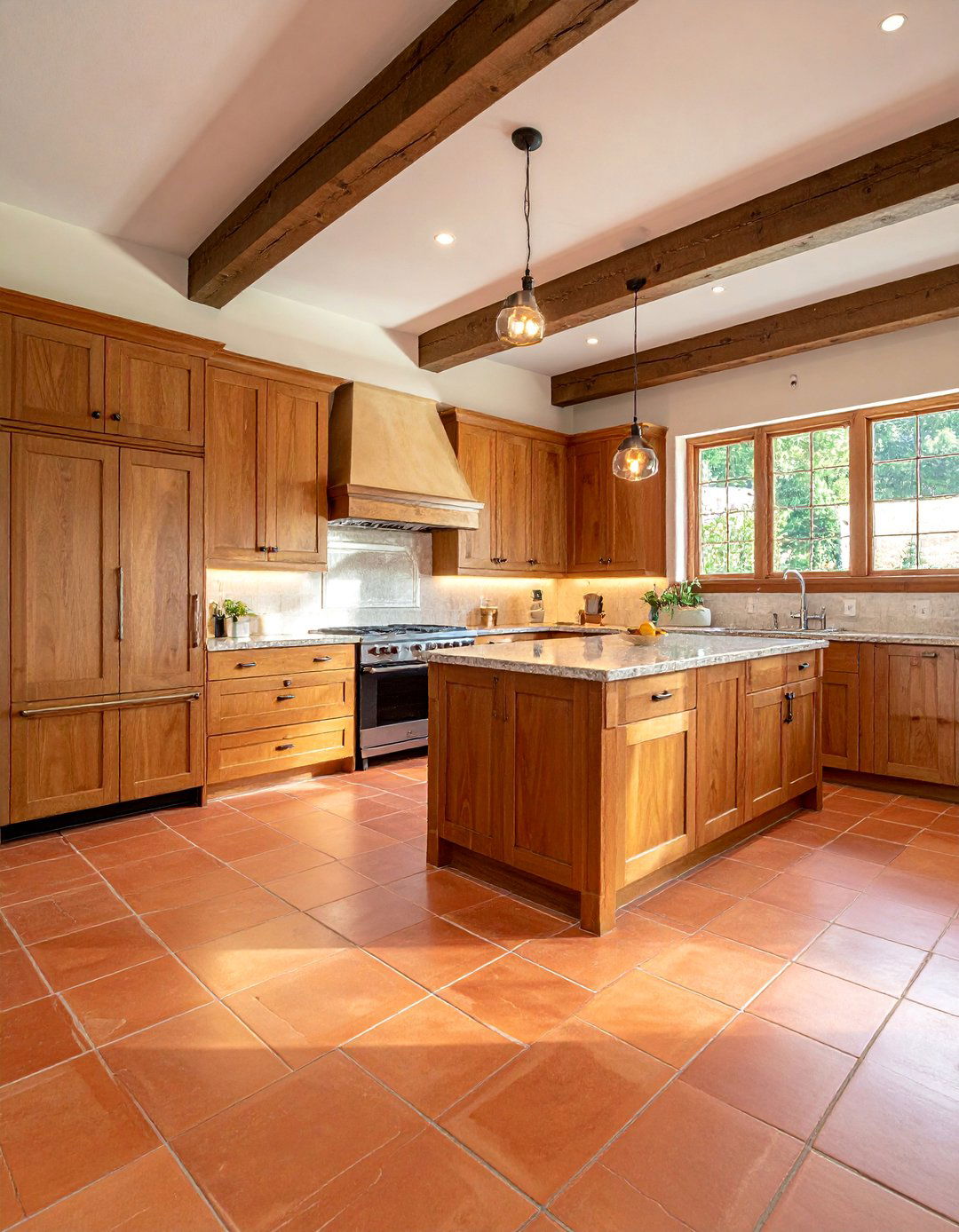
Embrace a truly rustic and cohesive aesthetic by pairing a terracotta kitchen floor with natural wood cabinets. This combination doubles down on warm, natural materials, creating a kitchen that feels exceptionally cozy and welcoming. The earthy tones of the terracotta tiles beautifully complement the grain and hue of woods like oak, pine, or cherry. This pairing evokes the feeling of a rustic lodge or a traditional country home. To avoid the space feeling too dark, ensure there is plenty of natural light or incorporate lighter countertops and a simple backsplash. This design choice celebrates the beauty of raw materials, resulting in a timeless, grounded, and authentically rustic kitchen.
7. Large Format Terracotta Floor Tiles
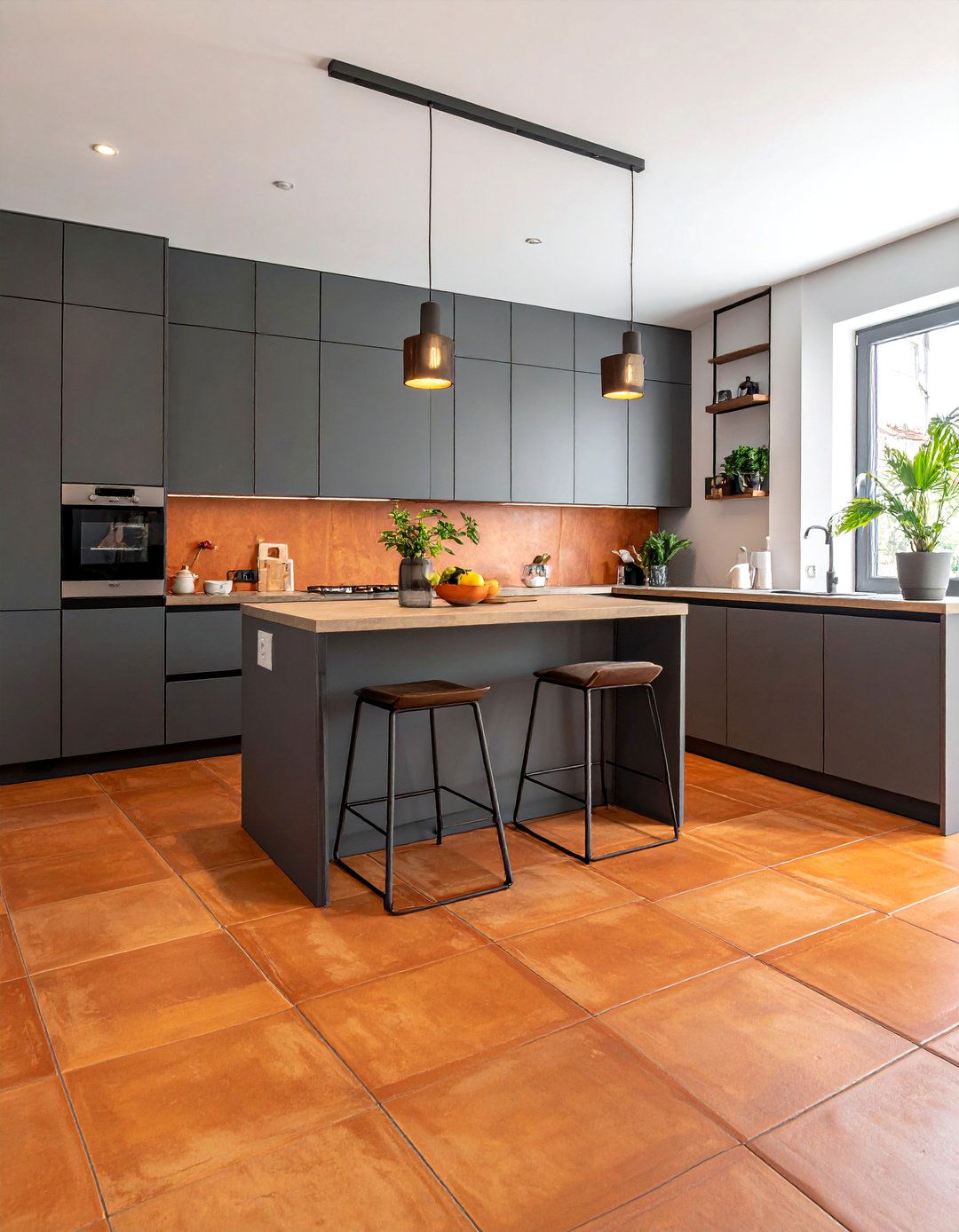
Using large format terracotta floor tiles is an excellent way to give a rustic kitchen a more modern and spacious feel. Tiles that are 12x12 inches or larger create fewer grout lines, resulting in a cleaner, more seamless appearance. This minimalist approach allows the natural beauty and color variation of the terracotta to take center stage without the distraction of a busy grid. A floor with fewer lines makes a room feel bigger and more open, making this a great option for both small and large kitchens. The simplicity of large tiles provides a contemporary counterpoint to other rustic elements like exposed wood beams or vintage-style appliances, creating a balanced and sophisticated space.
8. Small Format Terracotta Floor Tiles
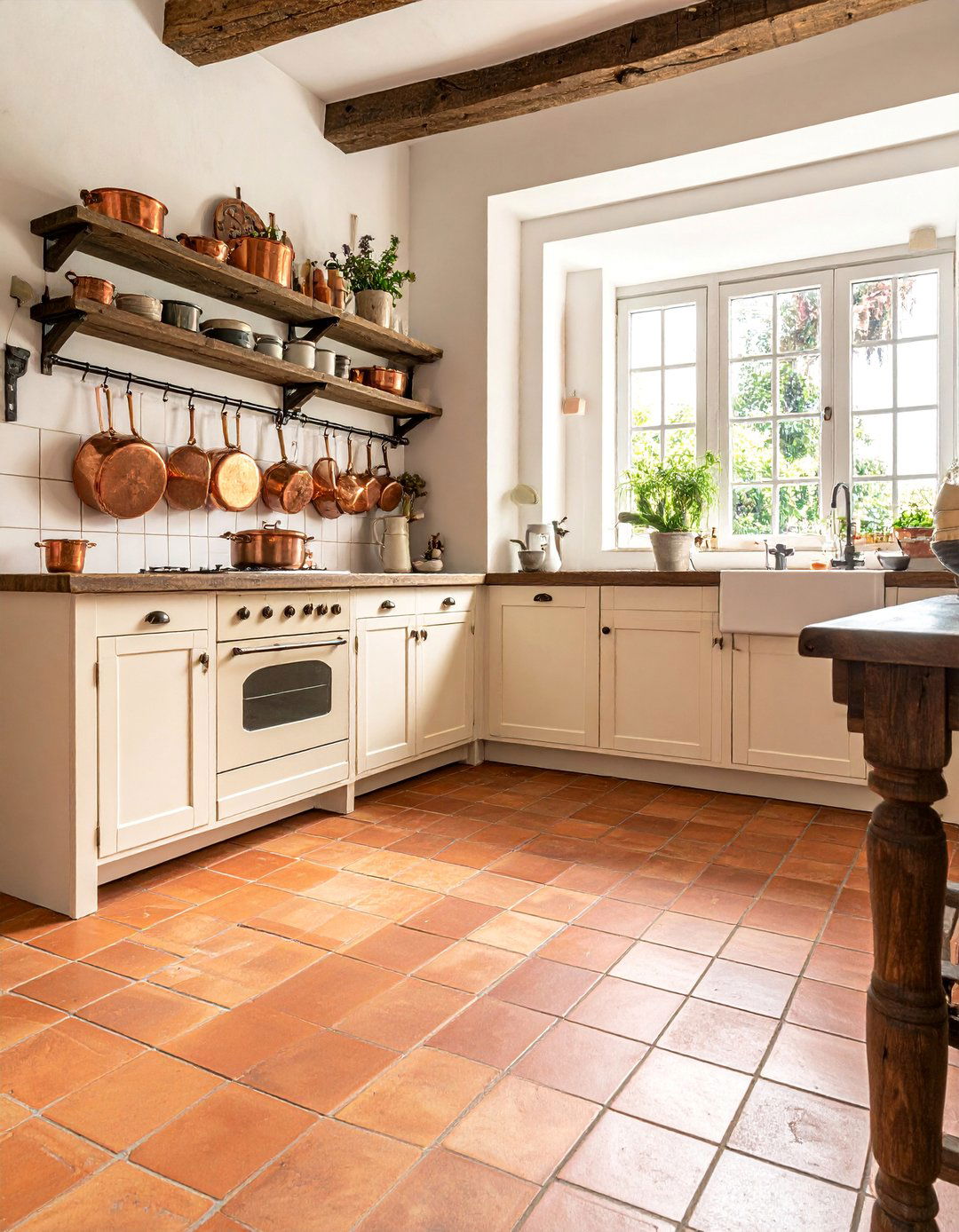
For an intricate and historically rich aesthetic, small format terracotta floor tiles offer immense charm. Smaller tiles, such as 4x4 or 6x6 inches, create a detailed, textured surface that is full of character. This style is reminiscent of historic European kitchens and courtyards, lending an authentic, time-worn feel to the space. The increased number of grout lines adds to the visual texture, making the floor a prominent design feature. This approach works wonderfully in smaller kitchens or in areas where you want to create a cozy, intimate atmosphere. Paired with vintage-inspired fixtures and open shelving, small format tiles help craft a kitchen that feels both quaint and authentically rustic.
9. Reclaimed Terracotta Kitchen Floor Tiles
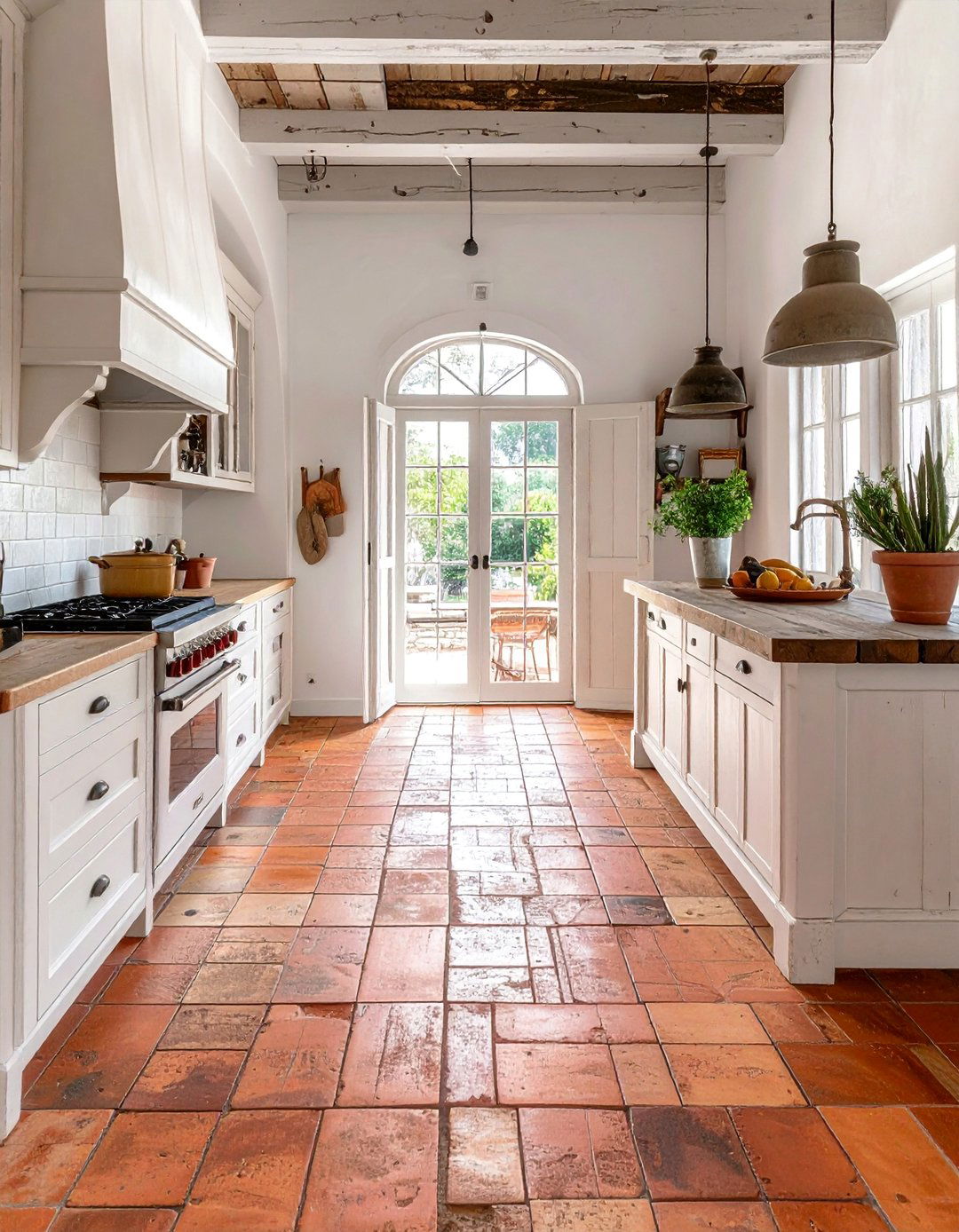
For the ultimate in rustic authenticity, a reclaimed terracotta kitchen floor is unparalleled. These tiles are salvaged from old buildings, carrying with them a rich history and a unique, aged patina that cannot be replicated. Each tile tells a story, with imperfections, color variations, and textures developed over decades or even centuries. Installing a reclaimed floor brings an immediate sense of soul and character to your kitchen, creating a look that is genuinely one-of-a-kind. While they may require more care in installation, the result is a stunningly beautiful and sustainable flooring choice that provides a deeply rooted, historical foundation for your rustic kitchen design.
10. Terracotta Floor with a Contrasting Dark Grout
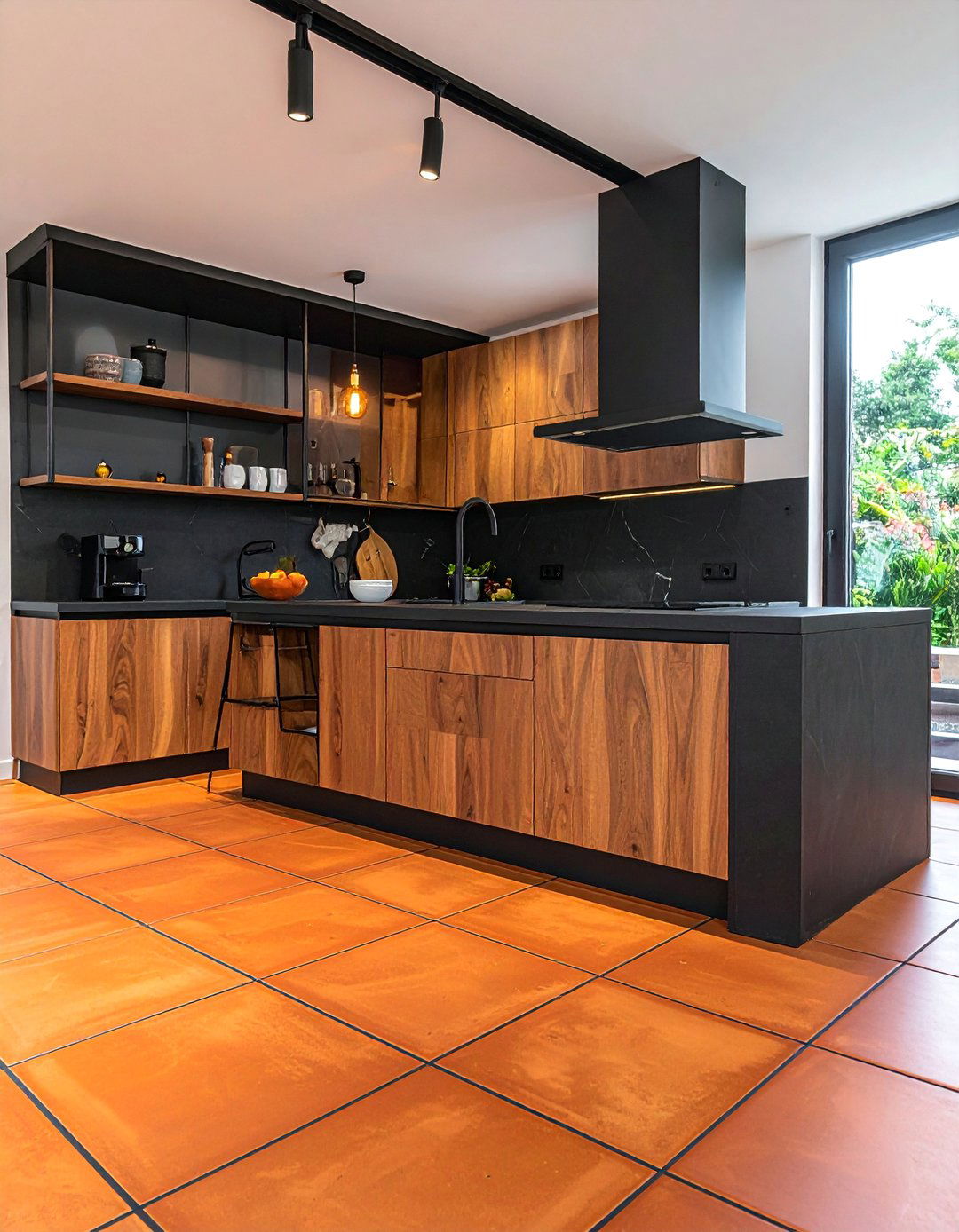
Choosing a contrasting dark grout for your terracotta kitchen floor is a powerful design move that emphasizes the shape of each tile. A charcoal, dark gray, or black grout line creates a bold grid or pattern that makes the floor a graphic focal point. This technique beautifully highlights the rustic, imperfect edges of the terracotta tiles, celebrating their handmade quality. The dark grout also offers practical benefits, as it is more forgiving of stains and discoloration over time compared to lighter options. This look is particularly effective with classic square or hexagonal tiles, adding a touch of industrial or modern flair to the otherwise rustic warmth of the terracotta.
11. Terracotta Floor with a Matching Light Grout
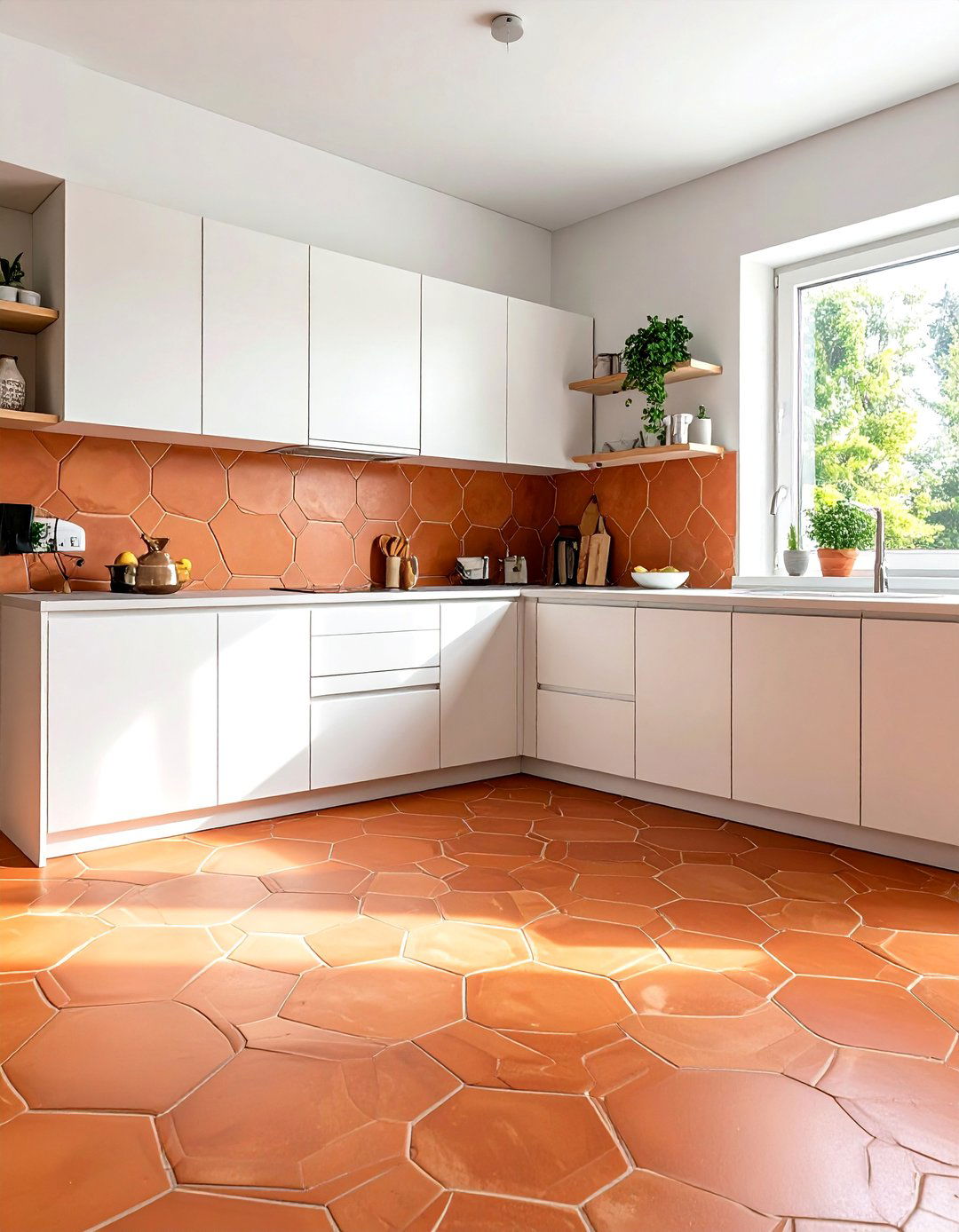
Opting for a matching light grout with your terracotta kitchen floor creates a soft, seamless, and unified appearance. A grout color that is close to the tile’s own hue, such as a sandy beige or light terra-cotta shade, minimizes the visibility of the grout lines. This allows the beautiful, warm tones of the tiles to blend together, forming a continuous, flowing surface. The result is a calmer, less busy look that enhances the feeling of space and tranquility in the kitchen. This approach is ideal for creating a serene and cohesive rustic aesthetic where the floor serves as a warm, textural backdrop rather than a bold, patterned statement piece.
12. Glazed Terracotta Kitchen Floor Tiles
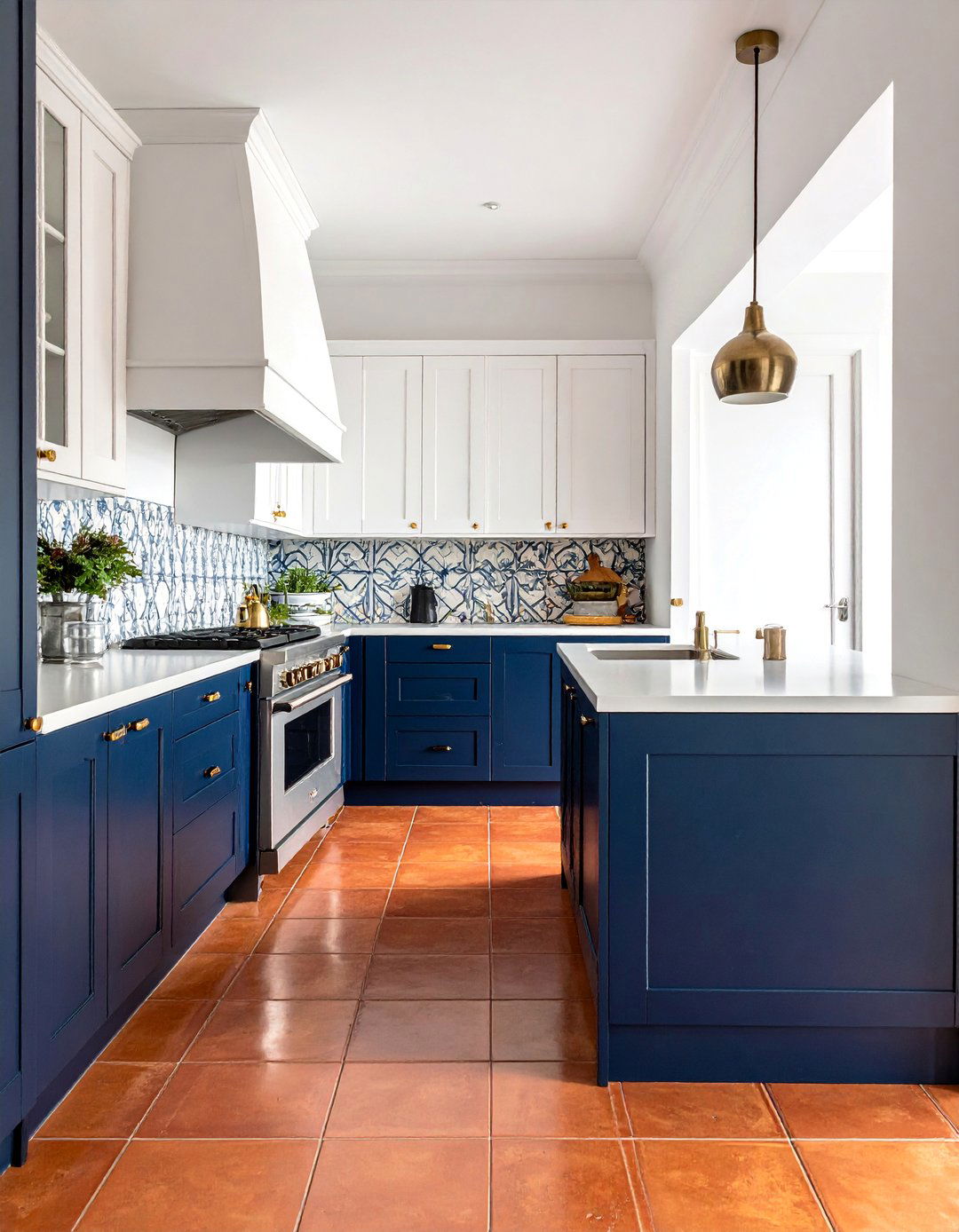
A glazed terracotta kitchen floor offers the perfect blend of rustic charm and practicality. The glaze provides a protective top layer that seals the porous clay, making the tiles resistant to stains, spills, and moisture—an ideal feature for a busy kitchen environment. Glazes come in various finishes, from a subtle satin to a high-gloss sheen, which can reflect light and brighten the room. While still retaining the characteristic warmth and color variation of traditional terracotta, the glazed surface adds a touch of refinement and makes cleaning significantly easier. This choice allows you to enjoy the aesthetic of terracotta without the maintenance concerns of unsealed tiles.
13. Terracotta Floor with a Blue Kitchen Island
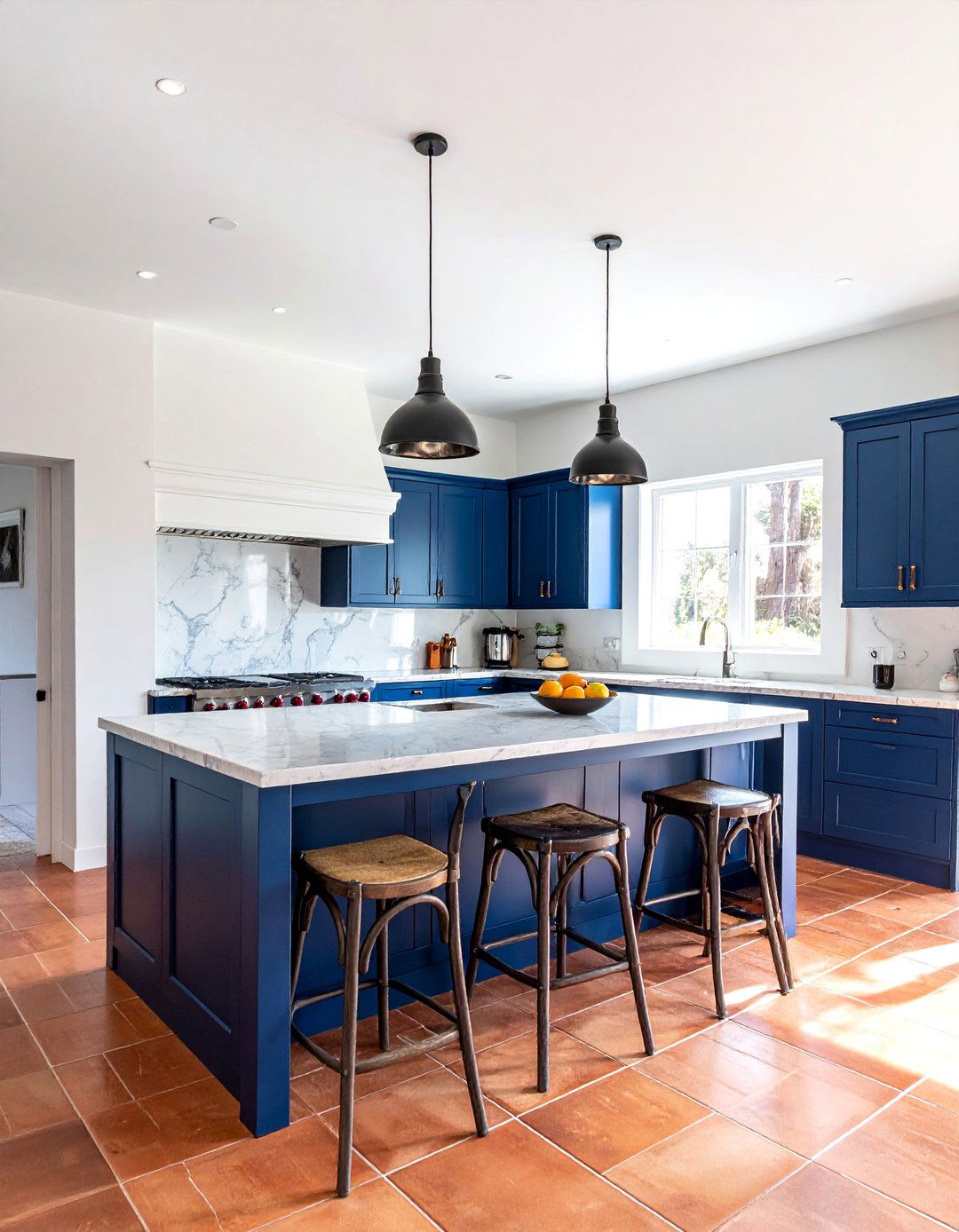
Create a stunning focal point in your rustic kitchen by pairing a warm terracotta floor with a cool blue kitchen island. This complementary color scheme is both striking and harmonious, evoking the feel of a Mediterranean coastal home. The earthy reds and oranges of the terracotta provide a beautiful, warm base that makes the blue of the island pop. Shades from a deep navy to a soft powder blue work equally well, each creating a different mood. This design choice injects a refreshing and unexpected splash of color into the rustic setting, balancing the warmth of the tiles with a cool, calming anchor in the center of the room.
14. Terracotta Floor in an Open-Concept Kitchen
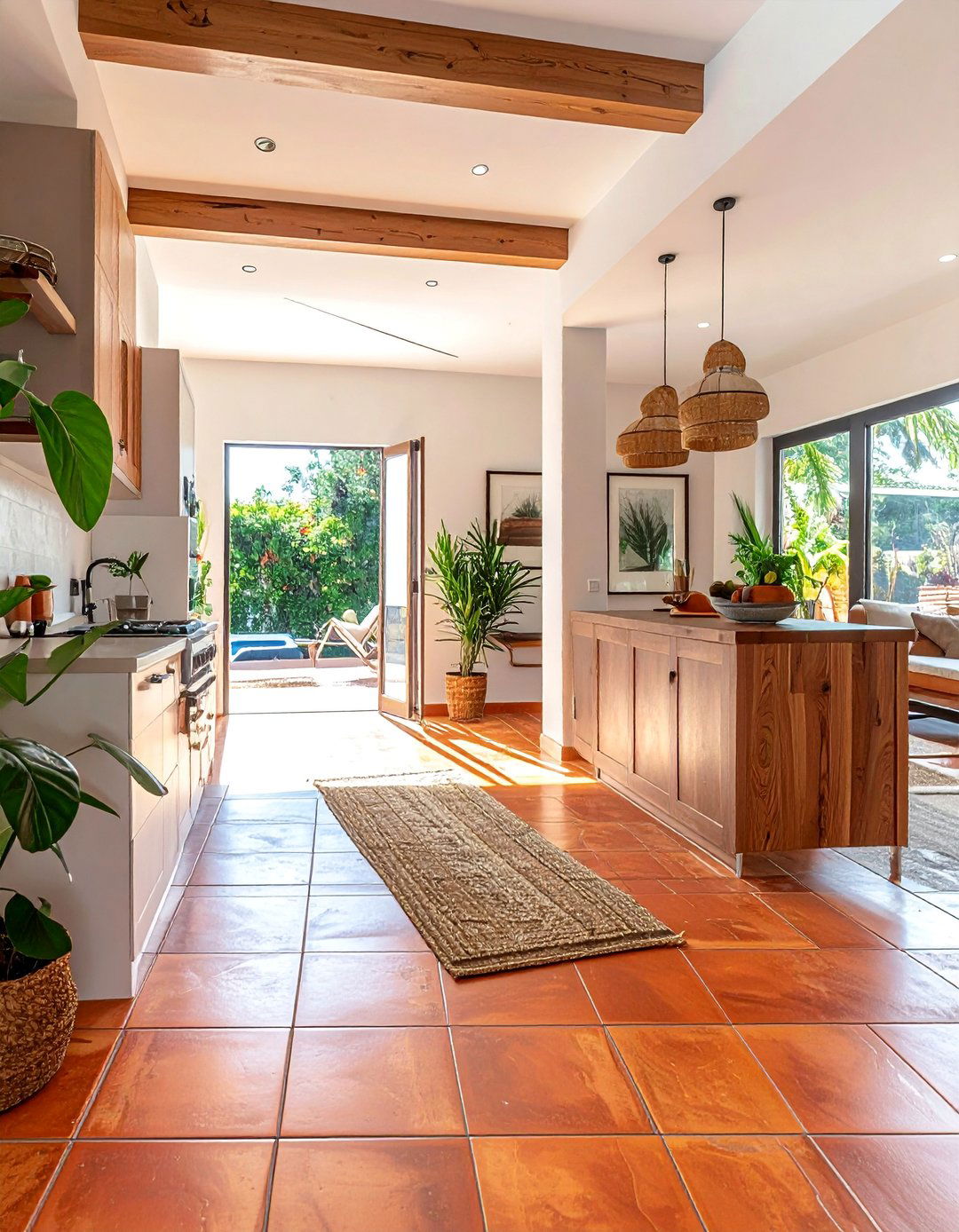
Using a terracotta floor in an open-concept kitchen is an excellent way to define the kitchen area while maintaining a cohesive flow with the adjoining living or dining spaces. The distinct color and texture of the terracotta tiles can visually anchor the kitchen, creating a designated zone without the need for walls. This warm, inviting flooring material helps make the kitchen feel like the heart of the home. To ensure a harmonious transition, you can complement the terracotta with wood flooring in the adjacent areas or use furniture and textiles that pick up on its warm tones. This approach beautifully blends rustic charm with modern, open-plan living.
15. Mixed-Shape Terracotta Tile Floor Pattern
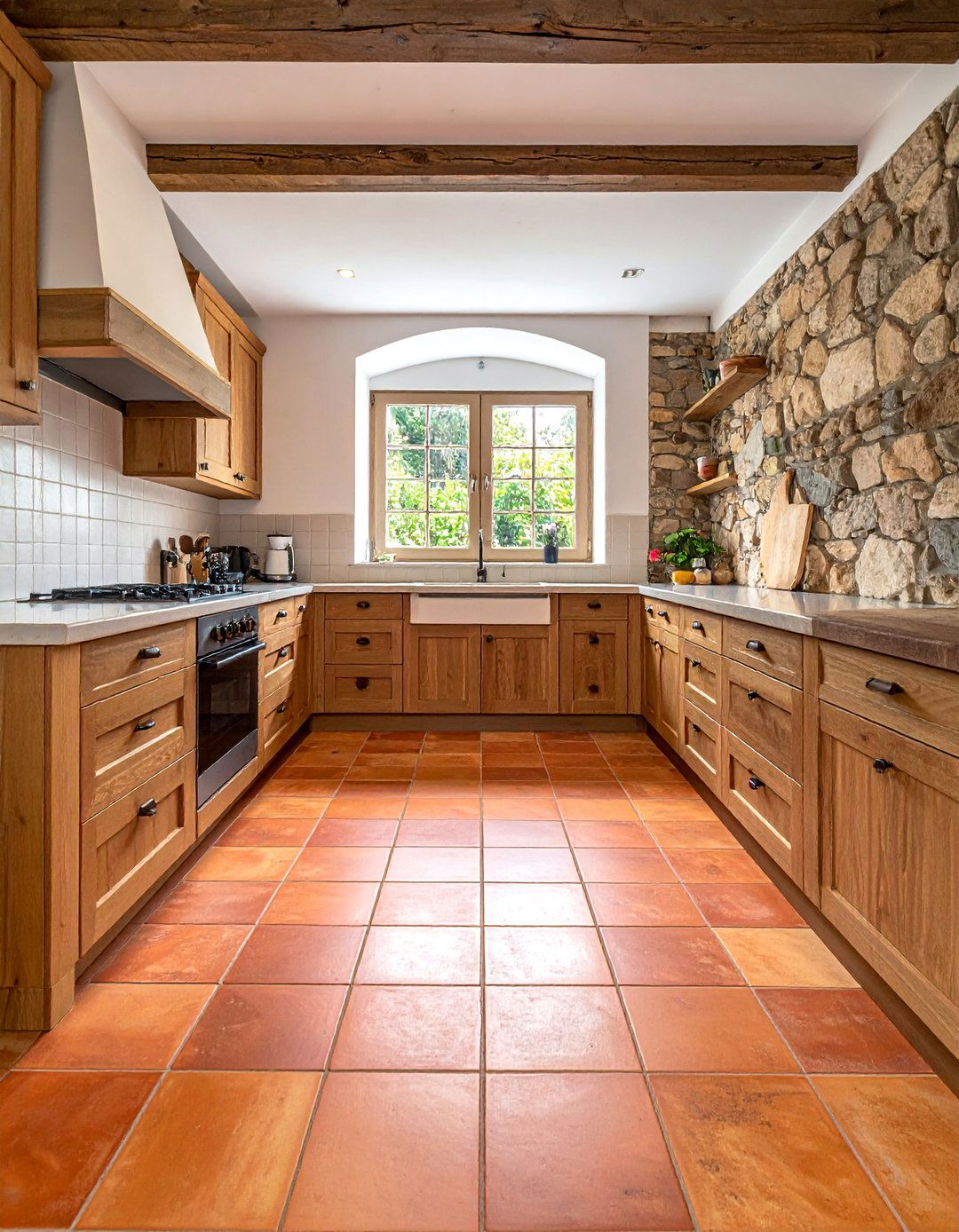
For a truly unique and artistic rustic kitchen, consider a mixed-shape terracotta tile floor pattern. Combining different shapes—such as squares, rectangles, and hexagons—creates a captivating and custom look that is full of personality. This 'picket' or 'paver' style arrangement breaks away from uniform patterns, resulting in a floor that feels organic and historically authentic, as if it were laid by hand generations ago. The interplay of different forms adds a layer of visual complexity and texture that is both charming and sophisticated. This design choice is perfect for homeowners looking to create a one-of-a-kind kitchen floor that stands out as a true work of art.
16. Terracotta Kitchen Floor with Black Accents
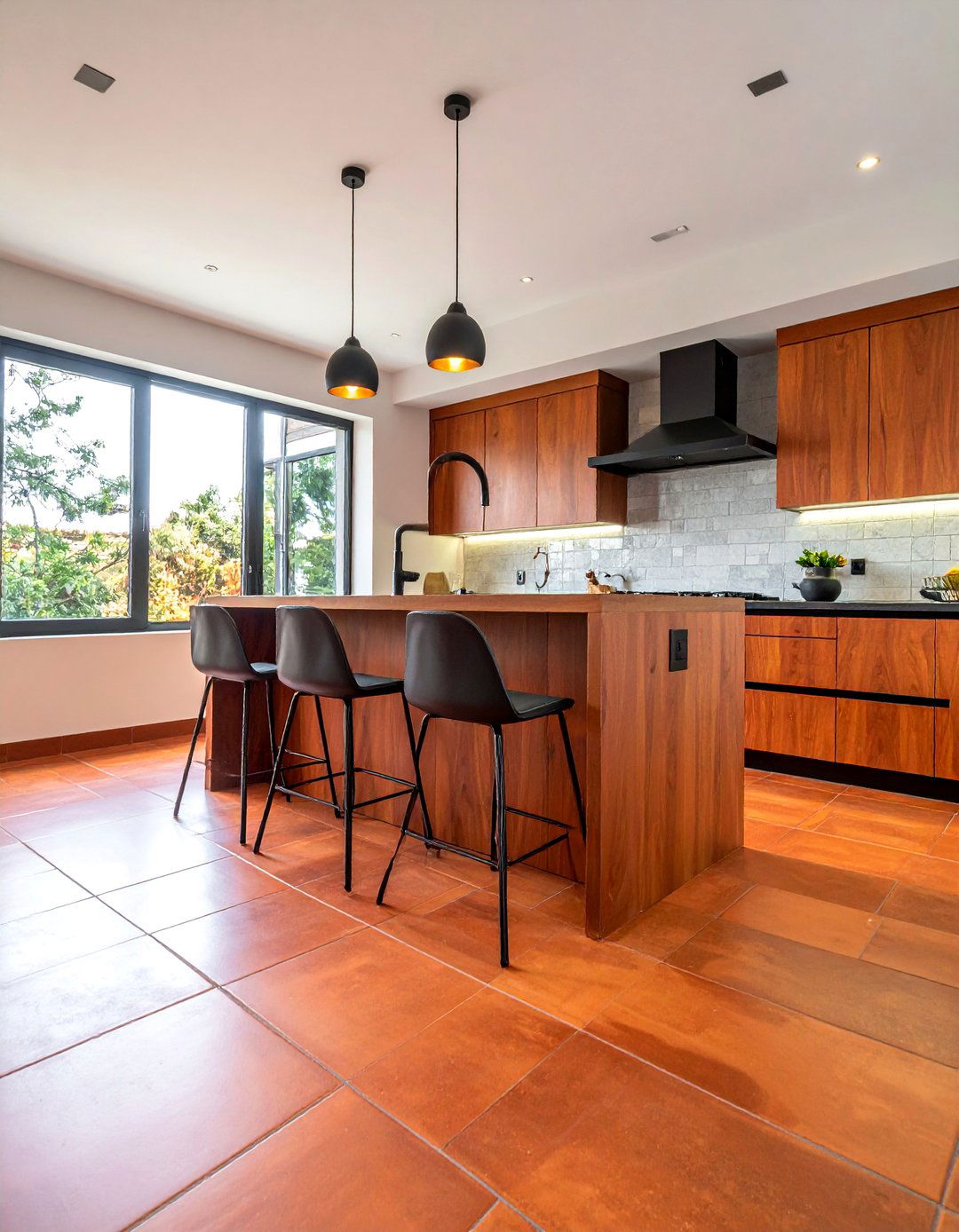
Introduce a touch of modern, industrial edge to your rustic kitchen by incorporating black accents alongside your terracotta floor. The combination of warm, earthy terracotta and bold, stark black creates a sophisticated and high-contrast look. Think black cabinet hardware, matte black faucets, minimalist pendant lighting, or black metal-framed chairs. These sleek accents provide a sharp counterpoint to the rustic texture of the floor, creating a design that feels both current and timeless. This pairing proves that rustic does not have to mean old-fashioned; it can be chic, modern, and incredibly stylish when balanced with strong, contemporary elements that make the entire space feel curated.
17. Terracotta Floor Extending to an Outdoor Patio
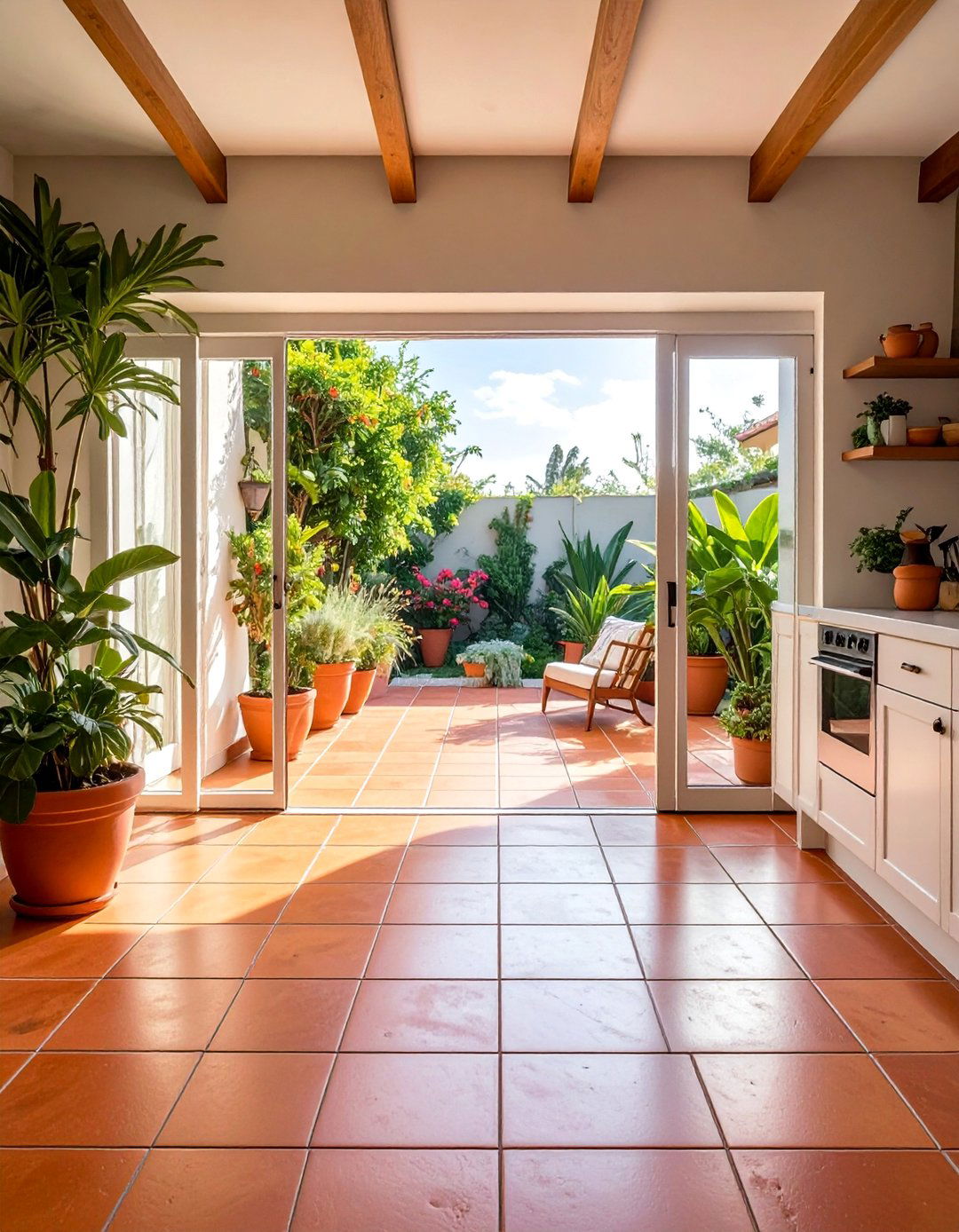
Create a seamless indoor-outdoor living experience by extending your terracotta kitchen floor to an adjacent patio or terrace. This design choice visually connects the interior and exterior spaces, making the kitchen feel larger and more integrated with nature. Terracotta is a durable material that is well-suited for both environments, providing a continuous, flowing surface when the doors are open. This is a hallmark of Mediterranean and Spanish-style homes, fostering a relaxed and expansive atmosphere perfect for entertaining. The consistent flooring material blurs the lines between inside and out, inviting natural light and fresh air into the heart of your home for a truly rustic, al fresco feel.
18. Rustic Kitchen with Terracotta Floors and Exposed Beams
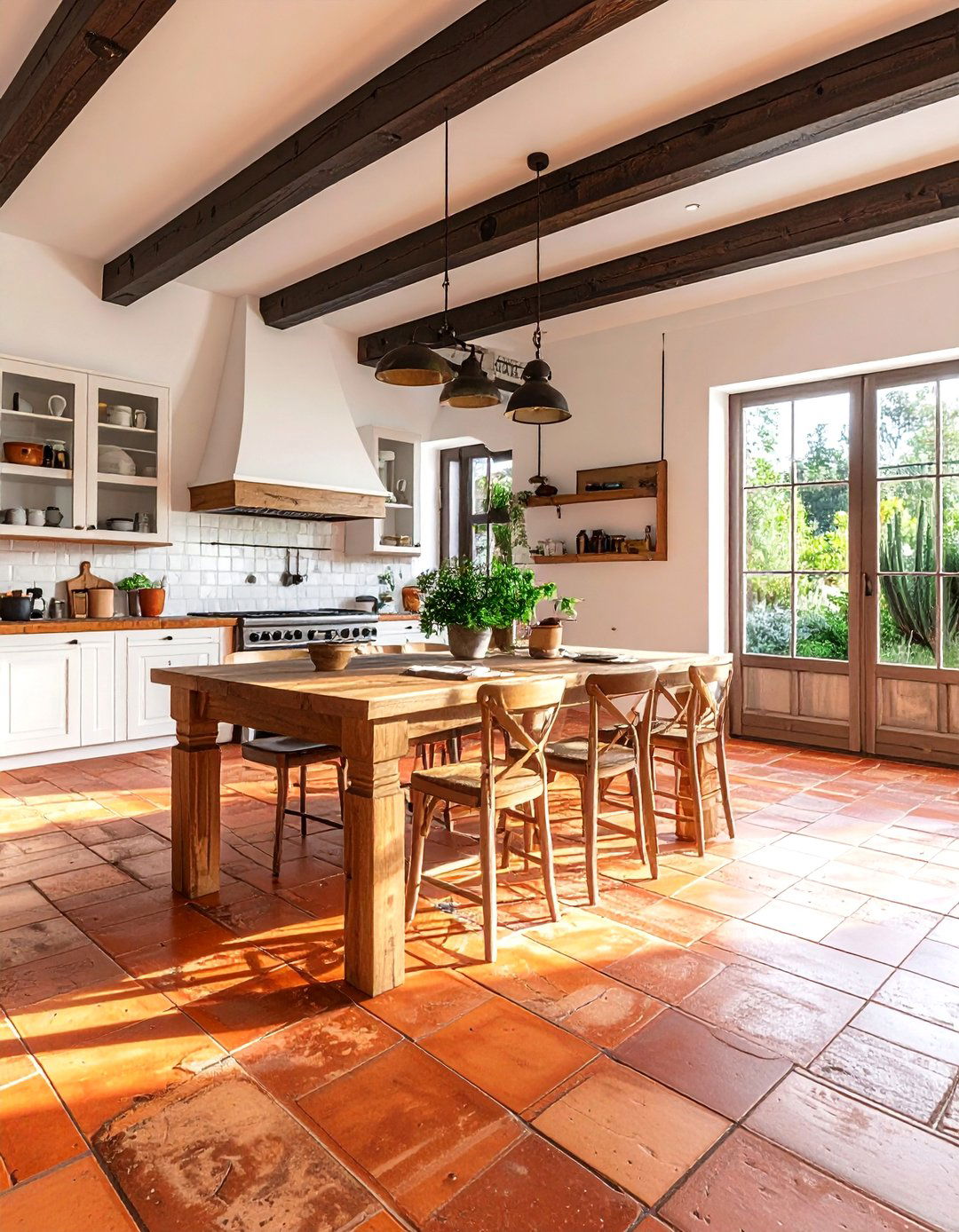
For the quintessential rustic aesthetic, combine a terracotta floor with exposed wooden beams on the ceiling. This pairing of foundational earth and overhead timber creates a powerful and authentic farmhouse or lodge atmosphere. The warm tones of the terracotta tiles resonate beautifully with the natural wood grain of the beams, enveloping the space in a cozy, welcoming ambiance. This combination celebrates structural honesty and natural materials, grounding the room from top to bottom. With white walls to keep the space from feeling too heavy, this design creates a kitchen that is rich in texture, character, and timeless architectural charm that is both grand and comforting.
19. Terracotta Floor with a Colorful Patterned Backsplash
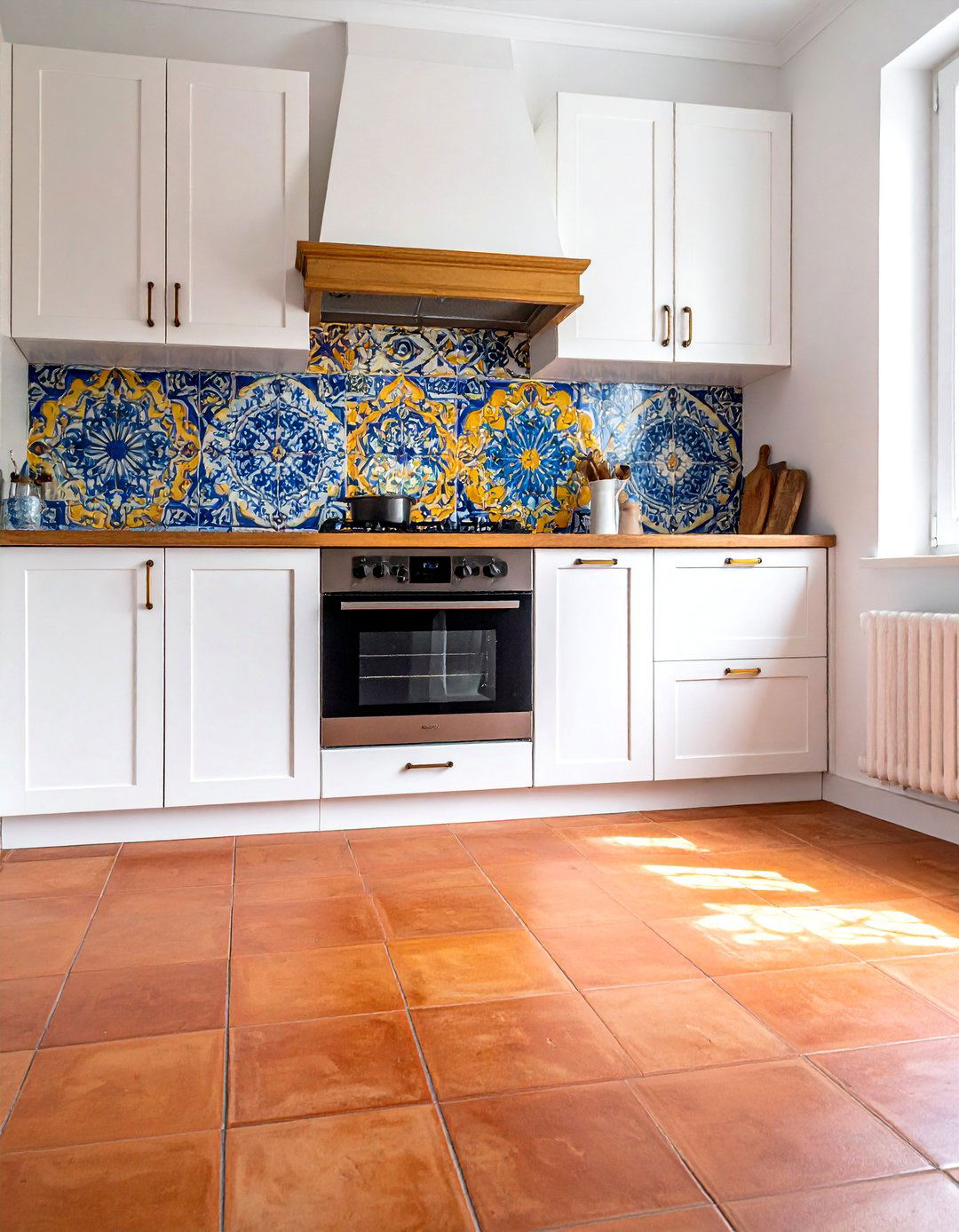
Inject personality and vibrancy into your rustic kitchen by pairing a simple terracotta floor with a colorful, patterned backsplash. The floor provides a warm, neutral, and earthy foundation, which allows a more elaborate tile backsplash to become a stunning focal point. Consider using hand-painted ceramic tiles, Moroccan Zellige tiles, or geometric cement tiles in shades of blue, green, or yellow. This creates a beautiful contrast between the simple, rustic floor and the intricate, decorative wall. The terracotta’s warmth will tie everything together, ensuring the space feels cohesive rather than chaotic. This approach is perfect for adding a touch of bohemian or artistic flair to your kitchen design.
20. Terracotta Floor with a Farmhouse Sink and Bridge Faucet
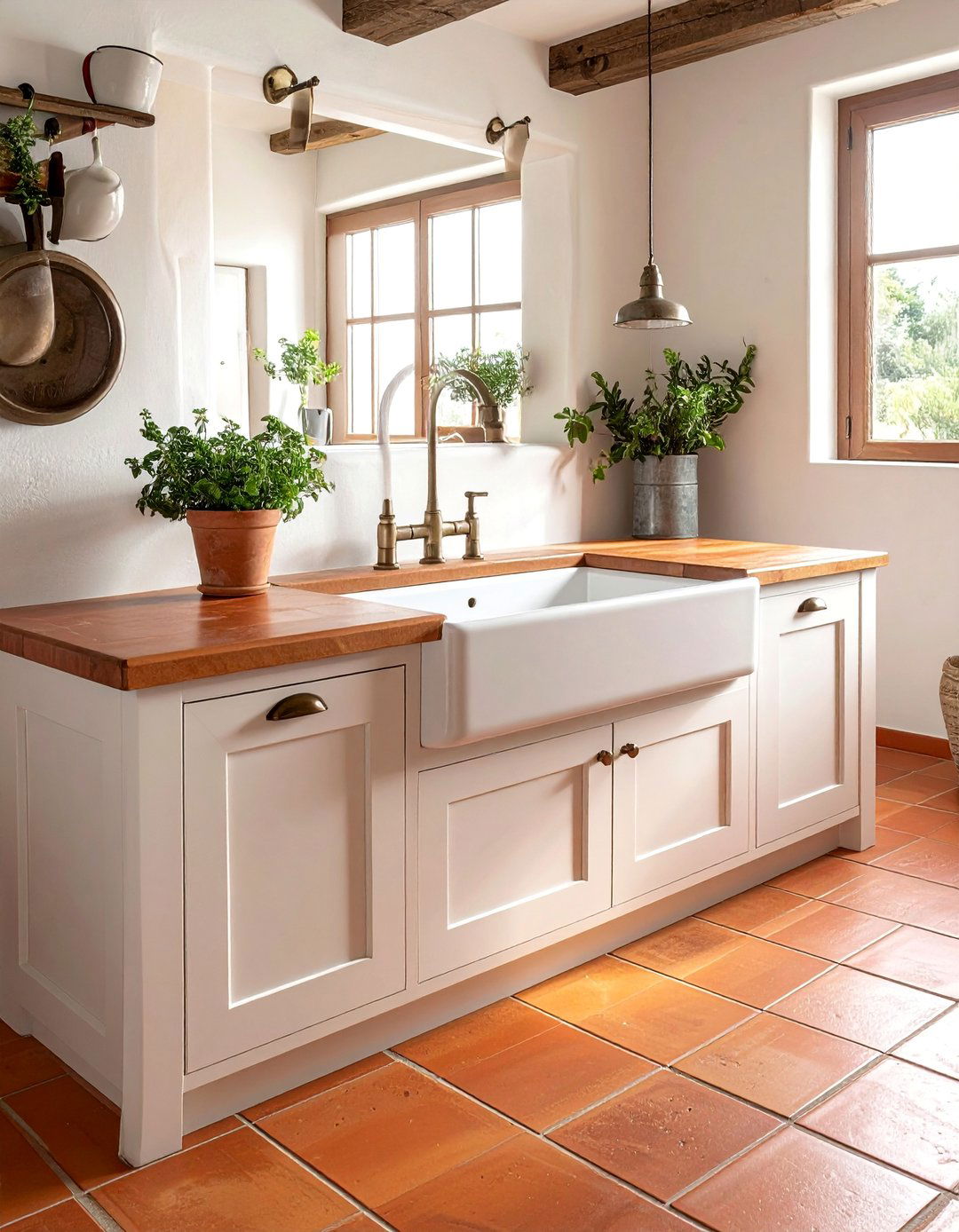
Finalize your rustic kitchen design by complementing a terracotta floor with iconic farmhouse elements like a large apron-front sink and a vintage-style bridge faucet. The deep, practical basin of a farmhouse sink is a classic feature that enhances the kitchen’s functionality and rustic charm. Paired with a bridge faucet in a finish like aged brass or oil-rubbed bronze, it creates a nostalgic and elegant focal point. These elements, set against the warm, earthy backdrop of the terracotta tiles, solidify the classic farmhouse or country aesthetic. This combination of practical, beautiful fixtures and timeless flooring creates a kitchen that feels both hardworking and utterly charming.
Conclusion:
Terracotta kitchen floors offer a versatile and enduring foundation for creating a rustic aesthetic. From classic square tiles to intricate herringbone patterns, the options are plentiful. Pairing these warm, earthy tiles with elements like white cabinets for brightness, green cabinets for a natural feel, or exposed beams for ultimate charm allows for endless personalization. Whether you prefer a modern farmhouse look or a Mediterranean-inspired space, terracotta provides unmatched character and warmth. By thoughtfully selecting tile shape, grout color, and complementary decor, you can design a welcoming and timeless kitchen that beautifully balances rustic comfort with personal style.

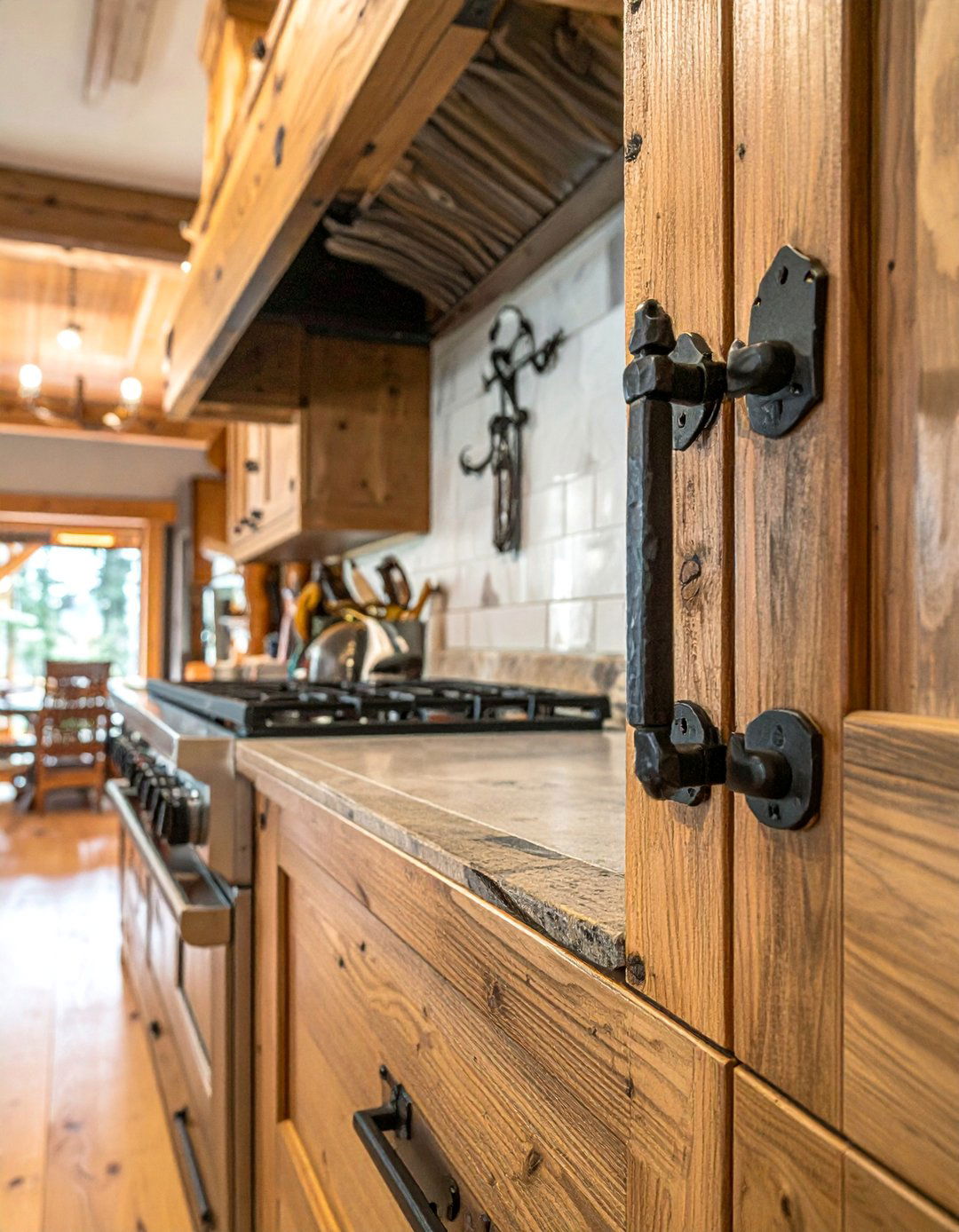
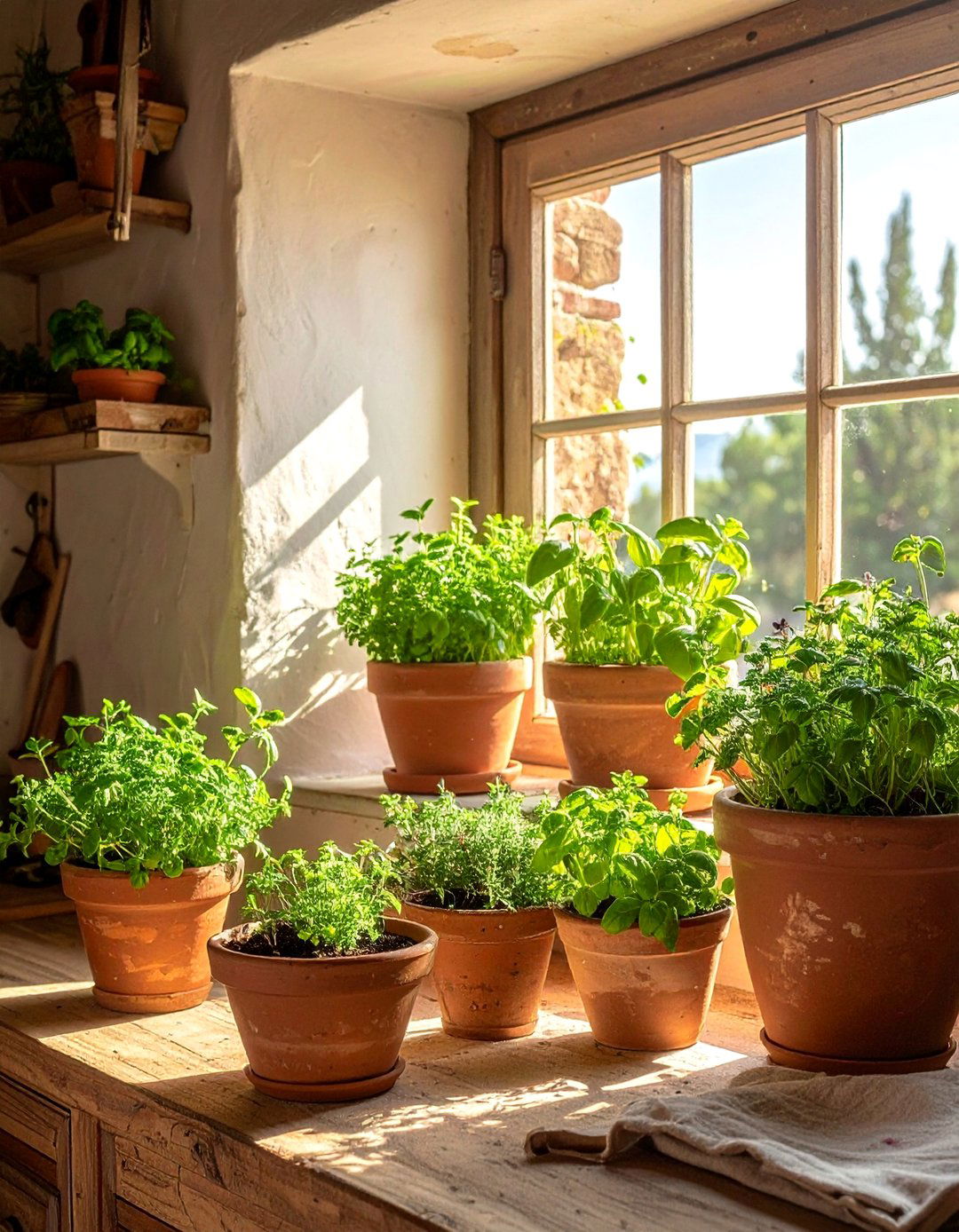
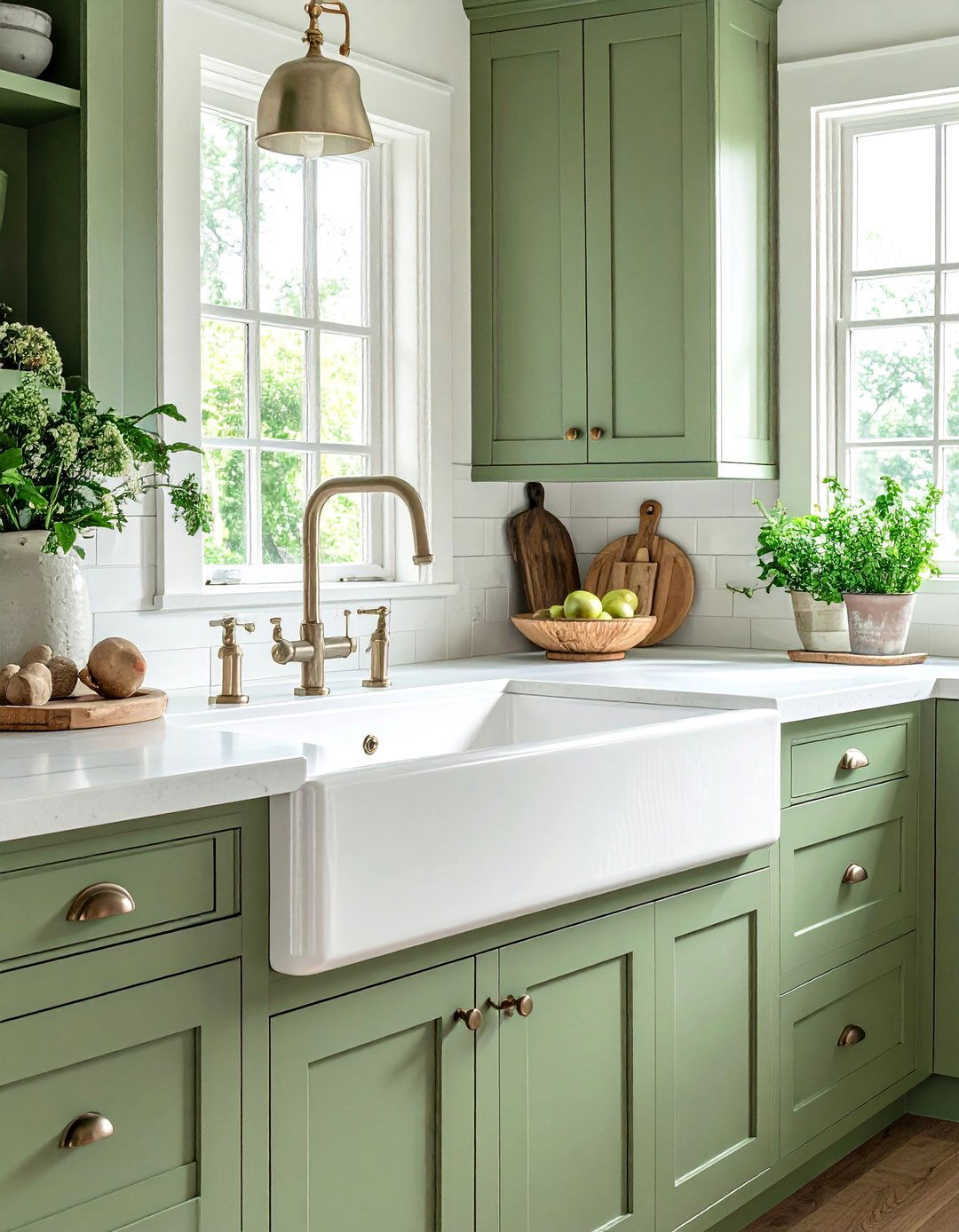
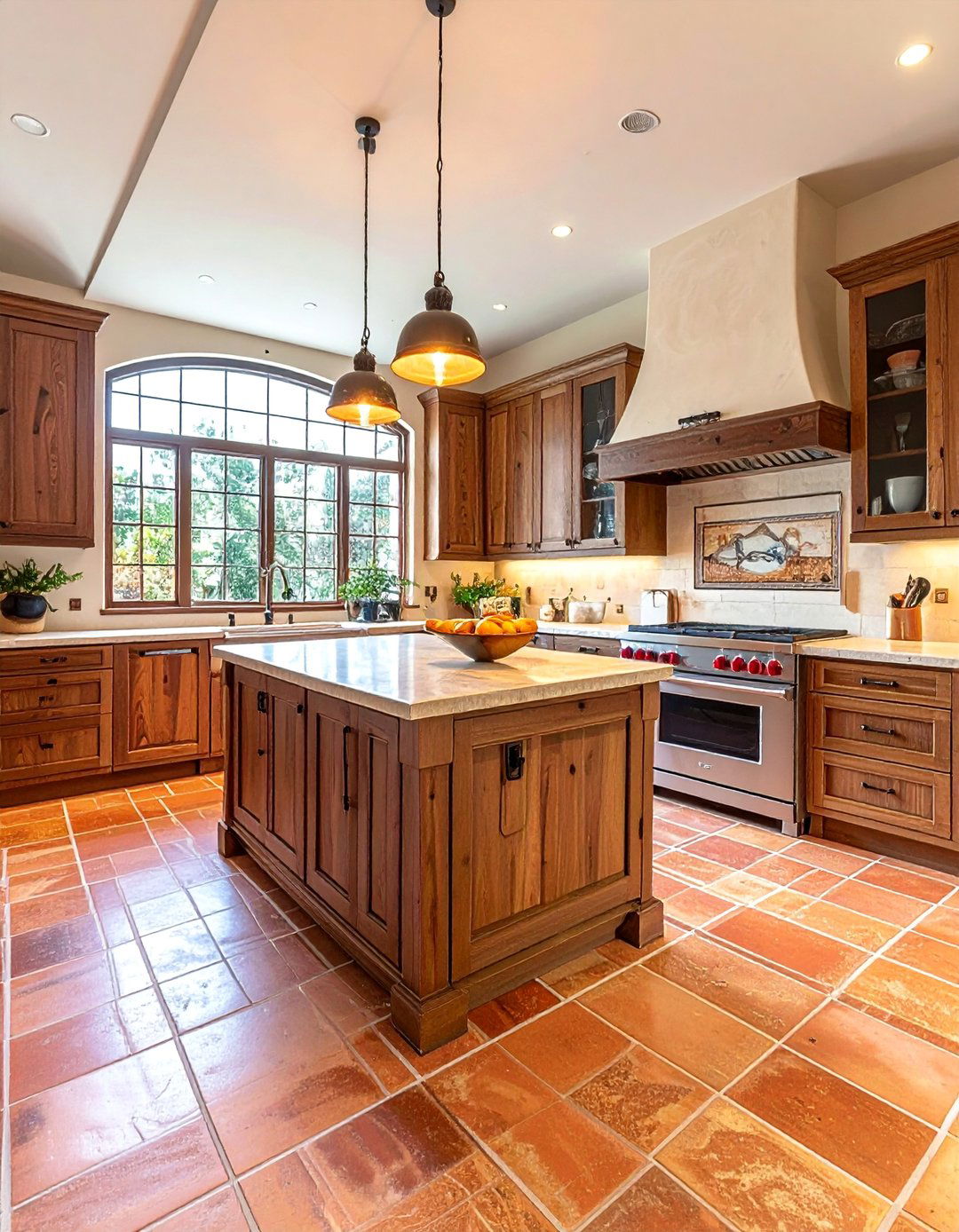
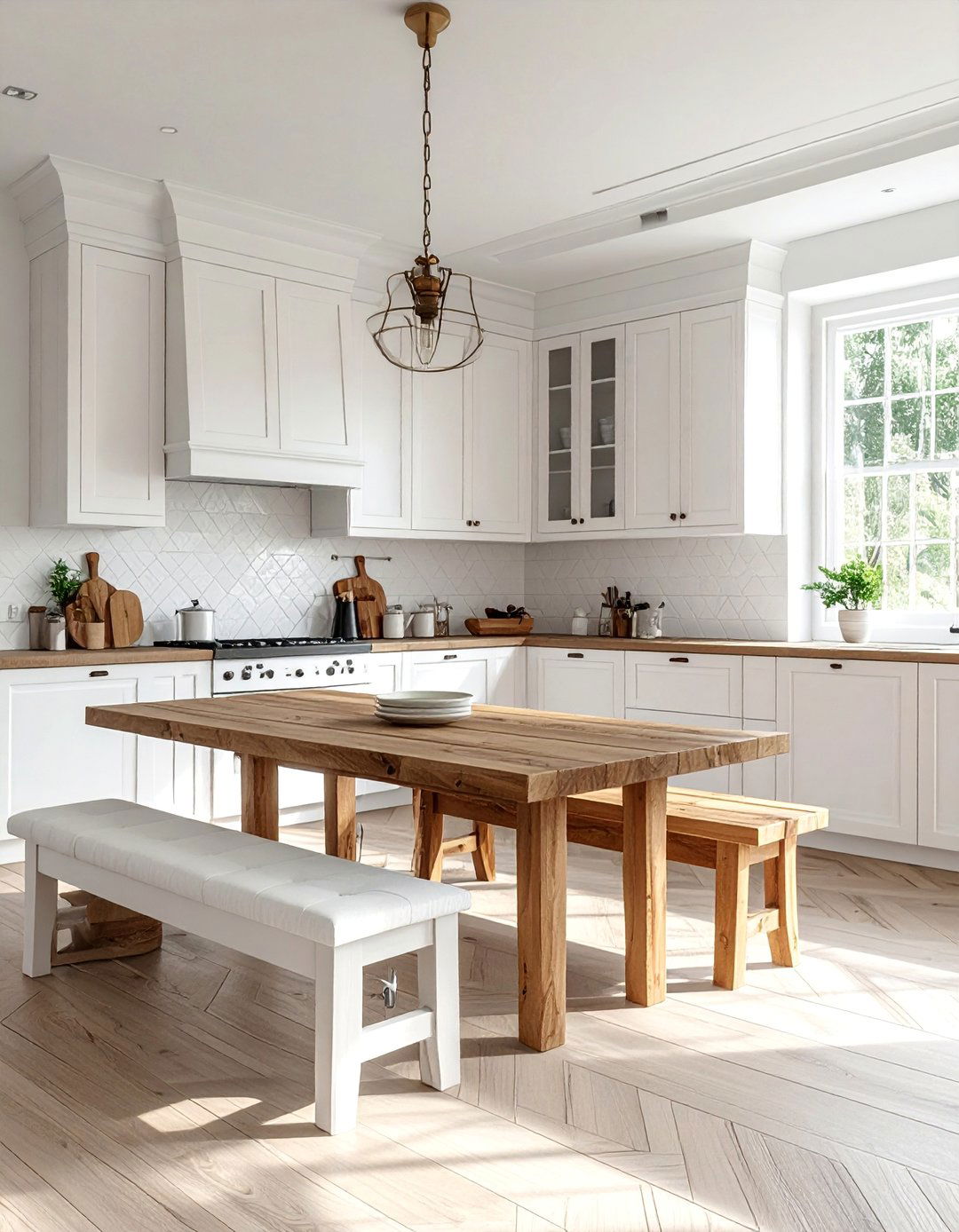
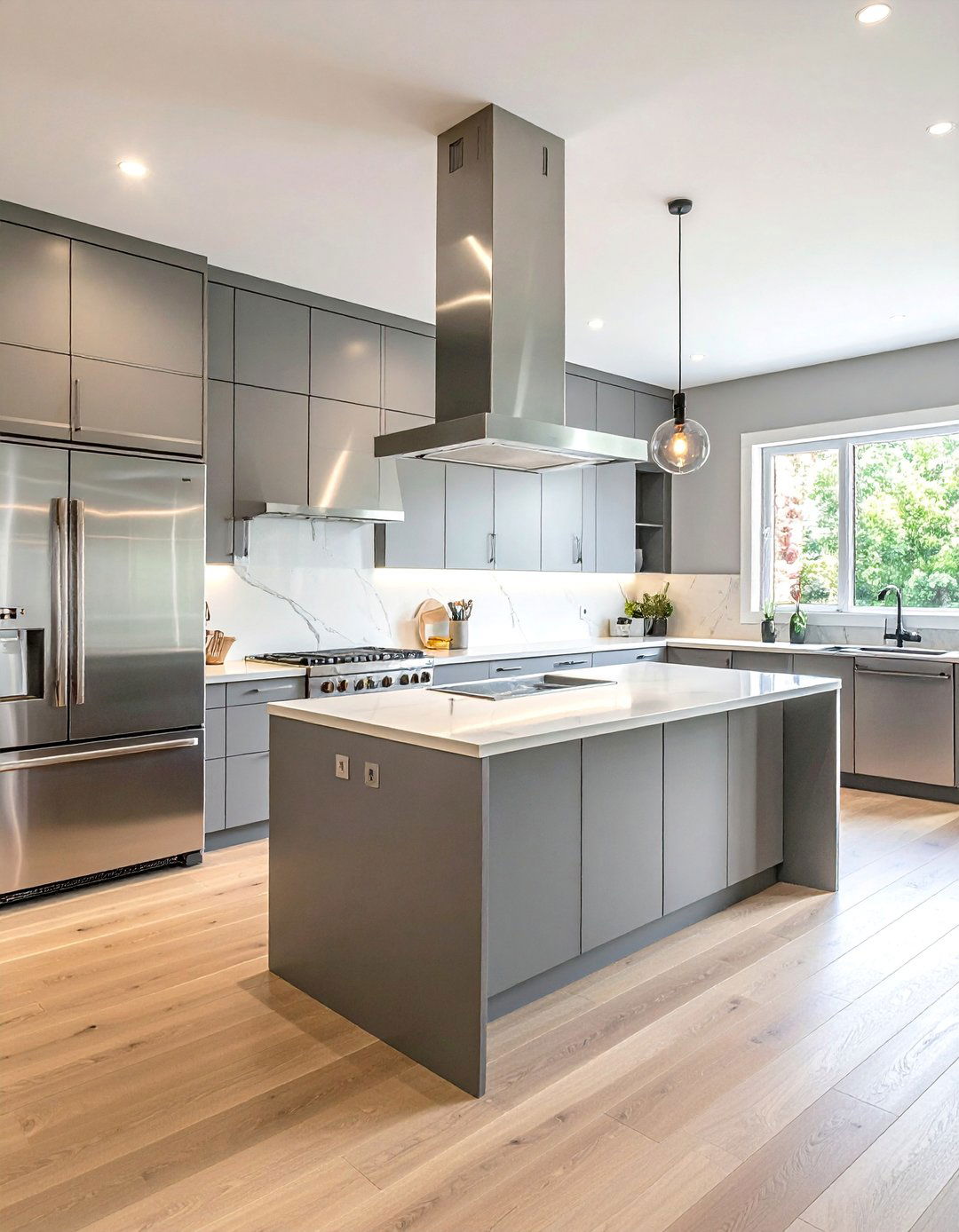
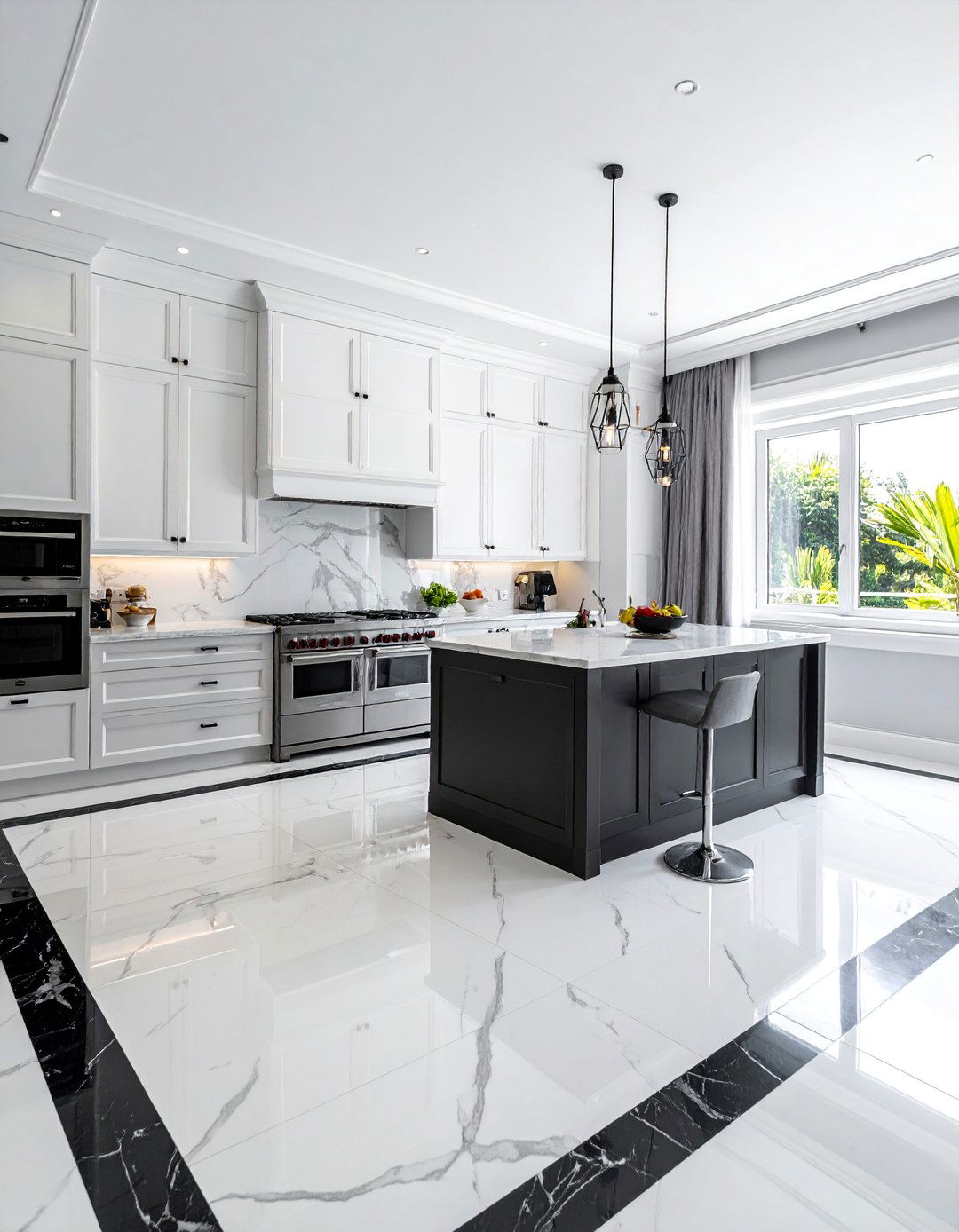
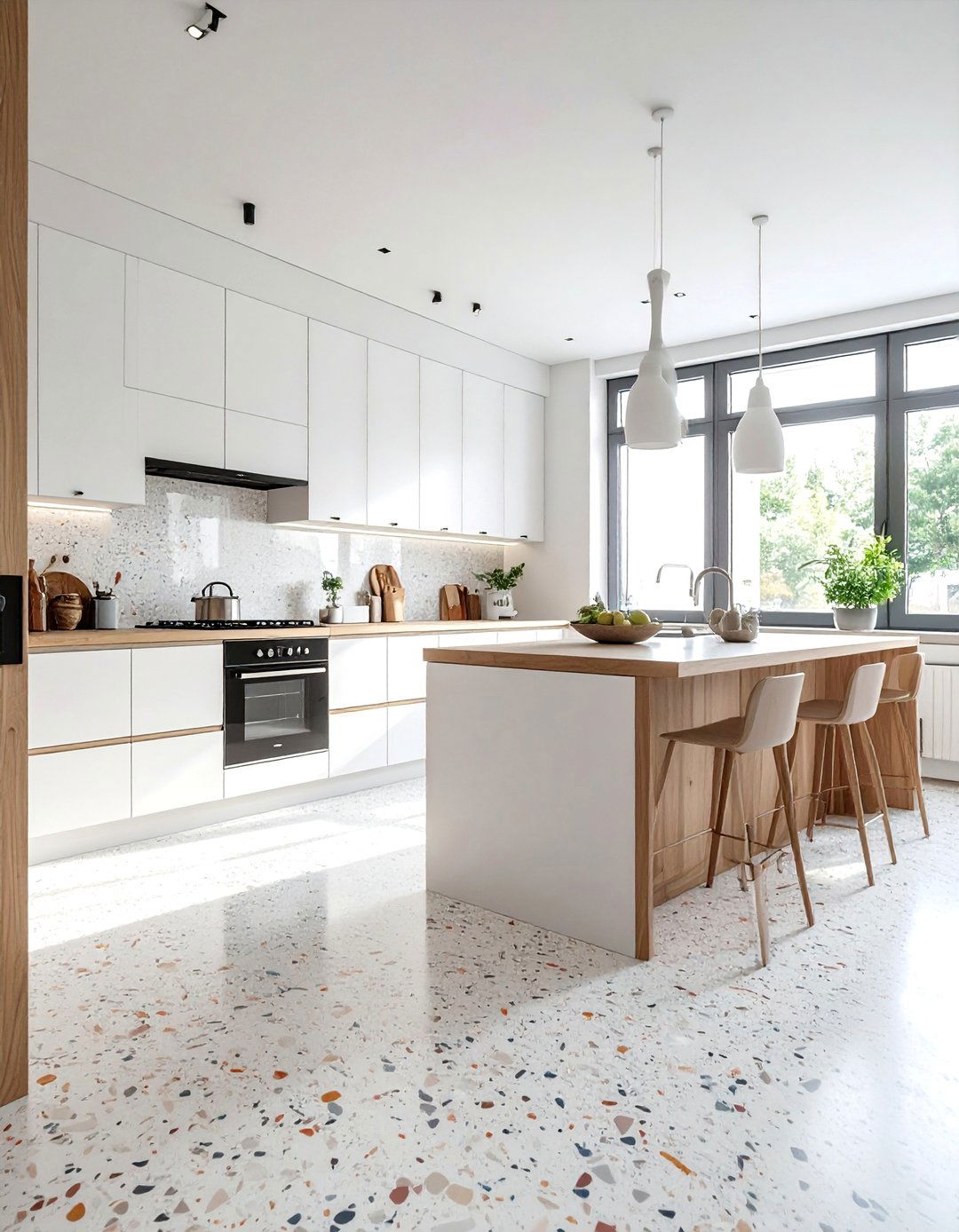
Leave a Reply